This class describes the magnetostriction operator EMM_MagnetostrictionOperator of the landau lifschitz system EMM_LandauLifschitzSystem basedon an EMMG_RealField. More...
#include <EMMG_MagnetostrictionOperator.h>
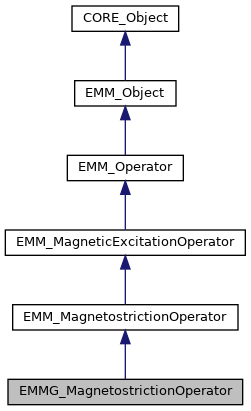
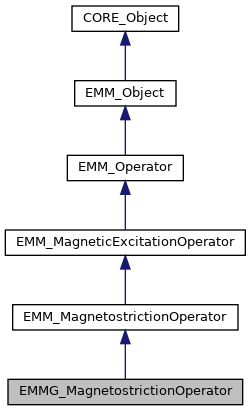
Public Member Functions | |
| virtual void | computeMagneticExcitationField (const EMM_RealArray &sigma, const EMM_RealField &M, EMM_RealField &H) const |
| compute the normalized excitation magnetic field at M More... | |
| virtual tBoolean | computeMagneticExcitationFieldGradient (const EMM_RealArray &sigma, const EMM_RealField &M, const EMM_RealField &D, EMM_RealField &gradH) const |
| compute the gradient of the magnetic excitation field at M in the direction D More... | |
| virtual tReal | computeEnergyWithMagneticExcitation (const tReal &t, const EMM_RealArray &sigma, const EMM_RealField &M, const EMM_RealField &H) const |
| compute the energy of the operator More... | |
| virtual tReal | computeEnergy (const tReal &t, const EMM_RealArray &sigma, const EMM_RealField &M, EMM_RealField &W) const |
| compute the energy of the operator More... | |
| virtual tBoolean | isAffine () const |
| return true if the operator is either constant or linear More... | |
| virtual tBoolean | isGradientComputationable () const |
| return true if the gradient of the magnetic excitation is computationable More... | |
| virtual tULLInt | getMemorySize () const |
| return the memory size in byte More... | |
| void | setIsMagneticAdimension (const tBoolean &v) |
| set if the adimensionment of the equation is magnetic More... | |
| void | setDisplacementMethod (const tString &m) |
| set the displacement method "FEM" or "FVM" ("FDM" deprecated) More... | |
| void | setDisplacementOperator (SP::EMM_DisplacementOperator op) |
| set the reverse relation Displacement operator More... | |
| void | resetDisplacementOperator () |
| reset the reverse relation Displacement operator More... | |
| const EMM_DisplacementOperator & | getDisplacementOperator () const |
| get the displacement operator More... | |
| EMM_DisplacementOperator & | getDisplacementOperator () |
| get the displacement operator More... | |
| virtual tUSInt | getDataFieldsNumber () const |
| get the number of field used in the operator More... | |
| virtual tBoolean | getDataFieldSpace (const tUSInt &index, tString &dataName, tFlag &supportType, tString &dFieldType, tUIndex &n, tDimension &dim) const |
| get the data field at index for saving data in vtk,txt,... files. More... | |
| virtual tBoolean | getDataField (const tUSInt &index, tString &dataName, tUIndex &n, tDimension &dim, const float *&values) const |
| get the data field at index for saving data in vtk,txt,... files. More... | |
| virtual tBoolean | getDataField (const tUSInt &index, tString &dataName, tUIndex &n, tDimension &dim, const double *&values) const |
| get the data field at index for saving data in vtk,txt,... files. More... | |
| virtual tBoolean | getDataField (const tUSInt &index, tString &dataName, tUIndex &n, tDimension &dim, const long double *&values) const |
| get the data field at index for saving data in vtk,txt,... files. More... | |
| virtual tBoolean | backup (const tString &prefix, const tString &suffix, const tString &ext) const |
| backup of the operator data into file(s) used for restoring More... | |
| virtual tBoolean | restore (const EMM_LandauLifschitzSystem &system, const tString &prefix, const tString &suffix, const tString &ext) |
| restore the operator data from file(s) More... | |
| virtual tBoolean | computeFieldsAtTime (const tReal &t, const tFlag &order, const EMM_RealArray &sigma, const EMM_RealField &dM_dt0, const EMM_RealField &M0) |
| compute the fields of operator at time More... | |
| virtual tBoolean | updateAtNextTimeStep (const tReal &dt, const EMM_RealArray &sigma, const EMM_RealField &Mt) |
| update the data of operator at next time step More... | |
| virtual void | adimensionize (const tReal &Le, const tReal &Ms, const tReal &T, const tReal &L) |
| adimensionize the operator More... | |
| virtual tBoolean | discretize (const EMM_LandauLifschitzSystem &system) |
| discretize and initialize the operator depending on method More... | |
| virtual tBoolean | resetToInitialState (const EMM_LandauLifschitzSystem &system) |
| reset the operator at initial state t=0 More... | |
| virtual tBoolean | computeMagneticExcitationFieldGradient (const tUIndex &nCells, const tDimension &dim, const EMM_RealArray &sigma, const tReal *M, const tReal *D, tReal *gradH) const |
| compute the gradient of the magnetic excitation field at M in the direction D More... | |
| tReal | computeMagneticExcitationFieldAndEnergy (const tReal &t, const EMM_RealArray &sigma, const EMM_RealField &Mt, EMM_RealField &Ht) const |
| compute the energy of the operator More... | |
| virtual tString | getName () const |
| return an human reading name of the operator More... | |
| const tBoolean & | isCubicVolume () const |
| return the true if the element is cubic More... | |
| const tReal & | getElementVolume () const |
| return the adimensionized volume of the element More... | |
| void | getSharedPointer (SP::CORE_Object &p) |
| get the shared pointer of this class into p More... | |
| void | getSharedPointer (SPC::CORE_Object &p) const |
| get the shared pointer of this class into p More... | |
| tString | getClassName () const |
| return the class name of the object More... | |
| tString | getIdentityString () const |
| return the identity string of the object of the form className_at_address More... | |
| tString | getPointerAddress () const |
| return the identity string of the object More... | |
| template<class T > | |
| tBoolean | isInstanceOf () const |
| test if the clas T is an instance of this class More... | |
| tBoolean | isInstanceOf (const tString &name) const |
| test if the object is an instance of className More... | |
Static Public Member Functions | |
| static SP::EMMG_MagnetostrictionOperator | New () |
| create a cubic anisotropy operator More... | |
| static void | setIsMemoryChecked (const tBoolean &v) |
| set if the memory checking is used More... | |
| static void | setOut (SP::CORE_Out out) |
| set the output stream More... | |
| static void | resetOut () |
| reset the output stream More... | |
| static void | setThread (SP::CORE_Thread thread) |
| set the thread More... | |
| static void | resetThread () |
| reset the output stream More... | |
| static CORE_Out & | out () |
| get the output More... | |
| static SP::CORE_Out | getOut () |
| get the output More... | |
| static CORE_Thread & | getThread () |
| get the profilier More... | |
| static const tBoolean & | isMemoryChecked () |
| get if the memory checking is used More... | |
| static tString | getClassName (const tString &identityString) |
| return the class name of the object More... | |
| template<class T > | |
| static tString | getTypeName () |
| get type name More... | |
| static tBoolean | is64Architecture () |
| return true if the machine is a 64 bits machine More... | |
| static tBoolean | is32Architecture () |
| return true if the machine is a 32 bits machine More... | |
| static tString | pointer2String (const void *obj) |
| return the string representation of a pointer More... | |
| static void | printObjectsInMemory (ostream &f) |
| print object in memory More... | |
| static void | printObjectsInMemory () |
| print object in memory in the standart output More... | |
| static tChar | getMaxChar () |
| get the max value for tChar type More... | |
| static tChar | getMinChar () |
| get the min value for tChar type More... | |
| static tUChar | getMaxUChar () |
| get the max value for tUChar type More... | |
| static tUChar | getMinUChar () |
| get the min value for tUChar type More... | |
| static tSInt | getMaxSInt () |
| get the max value for tSInt type More... | |
| static tSInt | getMinSInt () |
| get the min value for tSInt type More... | |
| static tUSInt | getMaxUSInt () |
| get the max value for tUSInt type More... | |
| static tUSInt | getMinUSInt () |
| get the min value for tUSInt type More... | |
| static tInt | getMaxInt () |
| get the max value for tInt type More... | |
| static tInt | getMinInt () |
| get the min value for tInt type More... | |
| static tUInt | getMaxUInt () |
| get the max value for tUInt type More... | |
| static tUInt | getMinUInt () |
| get the min value for tUInt type More... | |
| static tLInt | getMaxLInt () |
| get the max value for tLInt type More... | |
| static tLInt | getMinLInt () |
| get the min value for tLInt type More... | |
| static tULInt | getMaxULInt () |
| get the max value for tULInt type More... | |
| static tULInt | getMinULInt () |
| get the min value for tULInt type More... | |
| static tLLInt | getMaxLLInt () |
| get the max value for tULInt type More... | |
| static tLLInt | getMinLLInt () |
| get the min value for tLLInt type More... | |
| static tULLInt | getMaxULLInt () |
| get the max value for tULLInt type More... | |
| static tULLInt | getMinULLInt () |
| get the min value for tULLInt type More... | |
| static tFloat | getMaxFloat () |
| get the max value for tFloat type More... | |
| static tFloat | getMinFloat () |
| get the min value for tFloat type More... | |
| template<class T > | |
| static T | getEpsilon () |
| get the epsilon value for T type More... | |
| template<class T > | |
| static T | getInfinity () |
| get the infinity for T type More... | |
| static tFloat | getFloatEpsilon () |
| get the epsilon value for tFloat type More... | |
| static tFloat | getFloatInfinity () |
| get the infinity value for tFloat type More... | |
| static tDouble | getMaxDouble () |
| get the max value for tDouble type More... | |
| static tDouble | getMinDouble () |
| get the min value for tDouble type More... | |
| static tDouble | getDoubleInfinity () |
| get the infinity value for tFloat type More... | |
| static tDouble | getDoubleEpsilon () |
| get the epsilon value for tDouble type More... | |
| static tLDouble | getMinLDouble () |
| get the min value for tLDouble type More... | |
| static tLDouble | getMaxLDouble () |
| get the max value for tLDouble type More... | |
| static tLDouble | getLDoubleEpsilon () |
| get the epsilon value for tLDouble type More... | |
| static tDouble | getLDoubleInfinity () |
| get the infinity value for tDouble type More... | |
| static tIndex | getMaxIndex () |
| get the max value for the array/vector indexing type More... | |
| static tIndex | getMinIndex () |
| get the min value for the array/vector indexing type More... | |
| static tUIndex | getMaxUIndex () |
| get the max value for difference the array/vector indexing type More... | |
| static tUIndex | getMinUIndex () |
| get the min value for difference the array/vector indexing type More... | |
| static tFlag | getMaxFlag () |
| get the max value for the tFlag type More... | |
| static tFlag | getMinFlag () |
| get the min value for the tFlag type More... | |
| static tUInteger | getMaxUInteger () |
| get the max value for the unsigned integer type More... | |
| static tUInteger | getMinUInteger () |
| get the min value for the unsigned integer type More... | |
| static tInteger | getMaxInteger () |
| get the max value for the integer type More... | |
| static tInteger | getMinInteger () |
| get the min value for the integer type More... | |
| static tReal | getMaxReal () |
| get the max value for the real type More... | |
| static tReal | getMinReal () |
| get the min value for the real type More... | |
| static tReal | getRealEpsilon () |
| get the eps which is the difference between 1 and the least value greater than 1 that is representable. More... | |
| static tReal | getRealInfinity () |
| get the infinity value More... | |
| template<class T > | |
| static T | computeEpsilon () |
| compute epsilon More... | |
Static Public Attributes | |
| static const tReal | Mu0 =4*M_PI*1e-07 |
| static const tReal | Gamma =-1.7e11 |
| static const tDimension | X =0 |
| static const tDimension | Y =1 |
| static const tDimension | Z =2 |
| static const tReal | NULL_VALUE [] ={0,0,0} |
Protected Member Functions | |
| EMMG_MagnetostrictionOperator (void) | |
| create More... | |
| virtual | ~EMMG_MagnetostrictionOperator (void) |
| destroy More... | |
| virtual void | computeMagneticExcitationField (const tUIndex &nCells, const tDimension &dim, const EMM_RealArray &sigma, const tReal *M, tReal *H) const |
| compute the normalized excitation magnetic field at M More... | |
| tReal | computeEnergy (const tReal &t, const tUIndex &nCells, const tDimension &dim, const EMM_RealArray &sigma, const tReal *M) const |
| compute the energy of the magnetostriction operator at current displacement and velocity More... | |
| virtual tString | toString () const |
| turn the operator into string More... | |
| virtual void | toDoAfterThisSetting () |
| method called after the setting of the shared pointer this method can only be called once. More... | |
| void | setThis (SP::CORE_Object p) |
| set this weak shared pointer called toDoAfterThis setting method More... | |
Private Member Functions | |
| SP_OBJECT (EMMG_MagnetostrictionOperator) | |
Detailed Description
This class describes the magnetostriction operator EMM_MagnetostrictionOperator of the landau lifschitz system EMM_LandauLifschitzSystem basedon an EMMG_RealField.
- Version
- 1.0
Constructor & Destructor Documentation
◆ EMMG_MagnetostrictionOperator()
|
inlineprotected |
◆ ~EMMG_MagnetostrictionOperator()
|
inlineprotectedvirtual |
destroy
Member Function Documentation
◆ adimensionize()
|
inlinevirtualinherited |
adimensionize the operator
- Parameters
-
[in] Le : common adimensionization for elastic tensor [in] Ms : common magnetization at saturation [in] T : caracterictic time [in] L : caracteristic length
adimensionize the associated displacement operator
Reimplemented from EMM_Operator.
References EMM_MagnetostrictionOperator::computeMagneticExcitationField(), EMM_MagnetostrictionOperator::discretize(), EMM_Object::Mu0, EMM_MagnetostrictionOperator::resetToInitialState(), tBoolean, tDimension, tReal, and tUIndex.

◆ backup()
|
virtualinherited |
backup of the operator data into file(s) used for restoring
- Parameters
-
prefix : common prefix of the saving files suffix : common suffix of the saving files ext : common extension of the saving files
- Returns
- if the displacement operaor backup has succeeded
Reimplemented from EMM_Operator.
References EMM_MagnetostrictionOperator::mDisplacementOperator.
Referenced by EMM_MagnetostrictionOperator::getDataField().

◆ computeEnergy() [1/2]
|
inlinevirtual |
compute the energy of the operator
- Parameters
-
t time in [0,dt[ where dt will be the next time step sigma weight of each cell M the magnetization field W the excitation magnetic field of the operator not computed
- Returns
- the energy
compute E such that:

Implements EMM_MagneticExcitationOperator.
References EMM_MagnetostrictionOperator::computeEnergy(), EMM_RealField::getDimension(), EMM_RealField::getSize(), null, tDimension, and tUIndex.
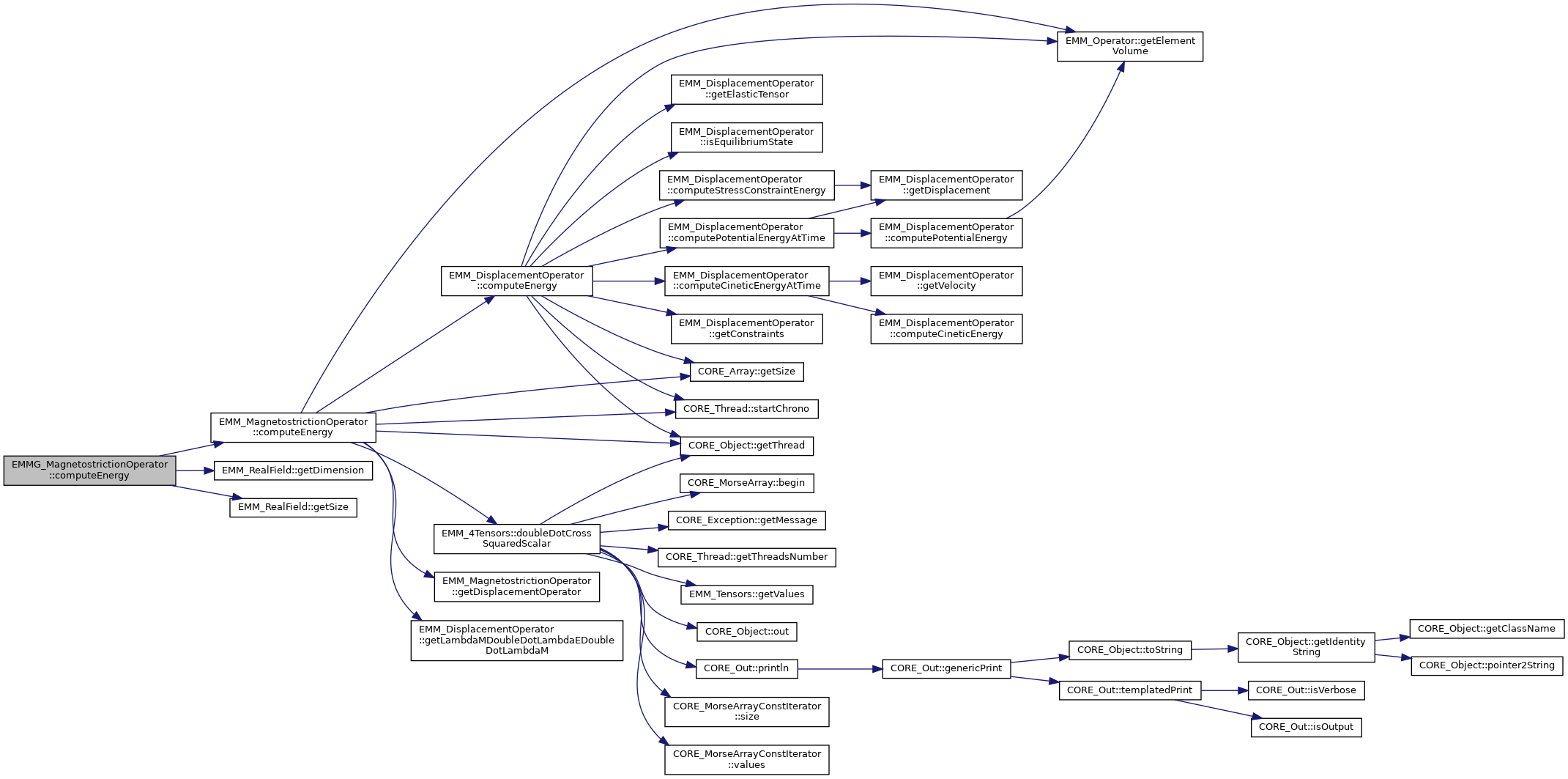
◆ computeEnergy() [2/2]
|
protectedinherited |
compute the energy of the magnetostriction operator at current displacement and velocity
- Parameters
-
t the time in [0,dt[ where dt is the time step nCells : number of cells dim dimension of each point of mesh sigma the weight of each cell M the magnetization field values
- Returns
- energy value :
![$ E(m,u)=\displaystyle \frac{1}{2} \int_\omega \sigma^4(x)[\tilde \lambda^e:(\tilde \lambda^m:m \otimes m)]:(\tilde \lambda^m:m \otimes m) d\omega $](form_992.png)



References EMM_DisplacementOperator::computeEnergy(), EMM_4Tensors::doubleDotCrossSquaredScalar(), EMM_MagnetostrictionOperator::getDisplacementOperator(), EMM_Operator::getElementVolume(), EMM_DisplacementOperator::getLambdaMDoubleDotLambdaEDoubleDotLambdaM(), CORE_Array< T >::getSize(), CORE_Object::getThread(), EMM_MagnetostrictionOperator::mMagneticExcitationAdimensionizedParameter, CORE_Thread::startChrono(), tBoolean, tReal, and tString.
Referenced by computeEnergy(), computeEnergyWithMagneticExcitation(), and EMM_MagnetostrictionOperator::computeMagneticExcitationFieldGradient().
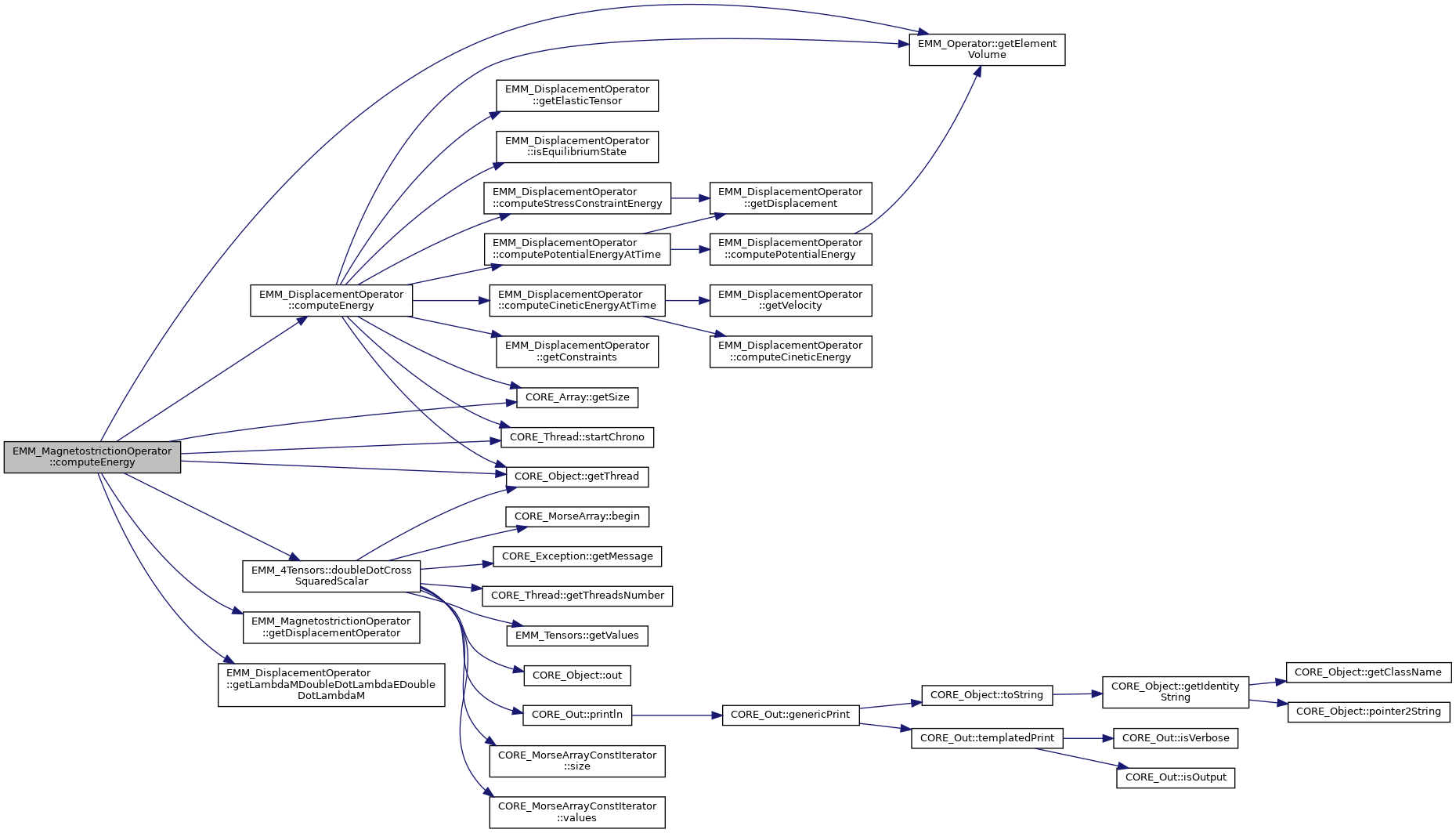
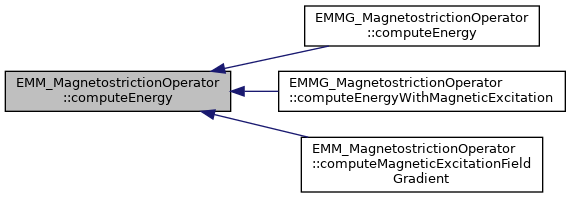
◆ computeEnergyWithMagneticExcitation()
|
inlinevirtual |
compute the energy of the operator
- Parameters
-
t the time of computation sigma weight of each cell M the magnetization field H the excitation magnetic field of the operator already computed
- Returns
- the energy
compute E such that:

The normalized energy is ![$ \displaystyle e_a(m)= - \displaystyle \sum_i \int_{\omega_i} \left [\tilde K_1 \sum_{s,t \in \{0,1,2\}, s>t} (\sigma_i m,U_s)^2(\sigma_i m,U_t)^2 + \tilde K_2 \displaystyle \prod_{s \in \{0,1,2\}} ( \sigma_i m,U_s)^2 \right ] dx$](form_1.png)
with 
Implements EMM_MagneticExcitationOperator.
References EMM_MagnetostrictionOperator::computeEnergy(), EMM_RealField::getDimension(), EMM_RealField::getSize(), null, tDimension, and tUIndex.
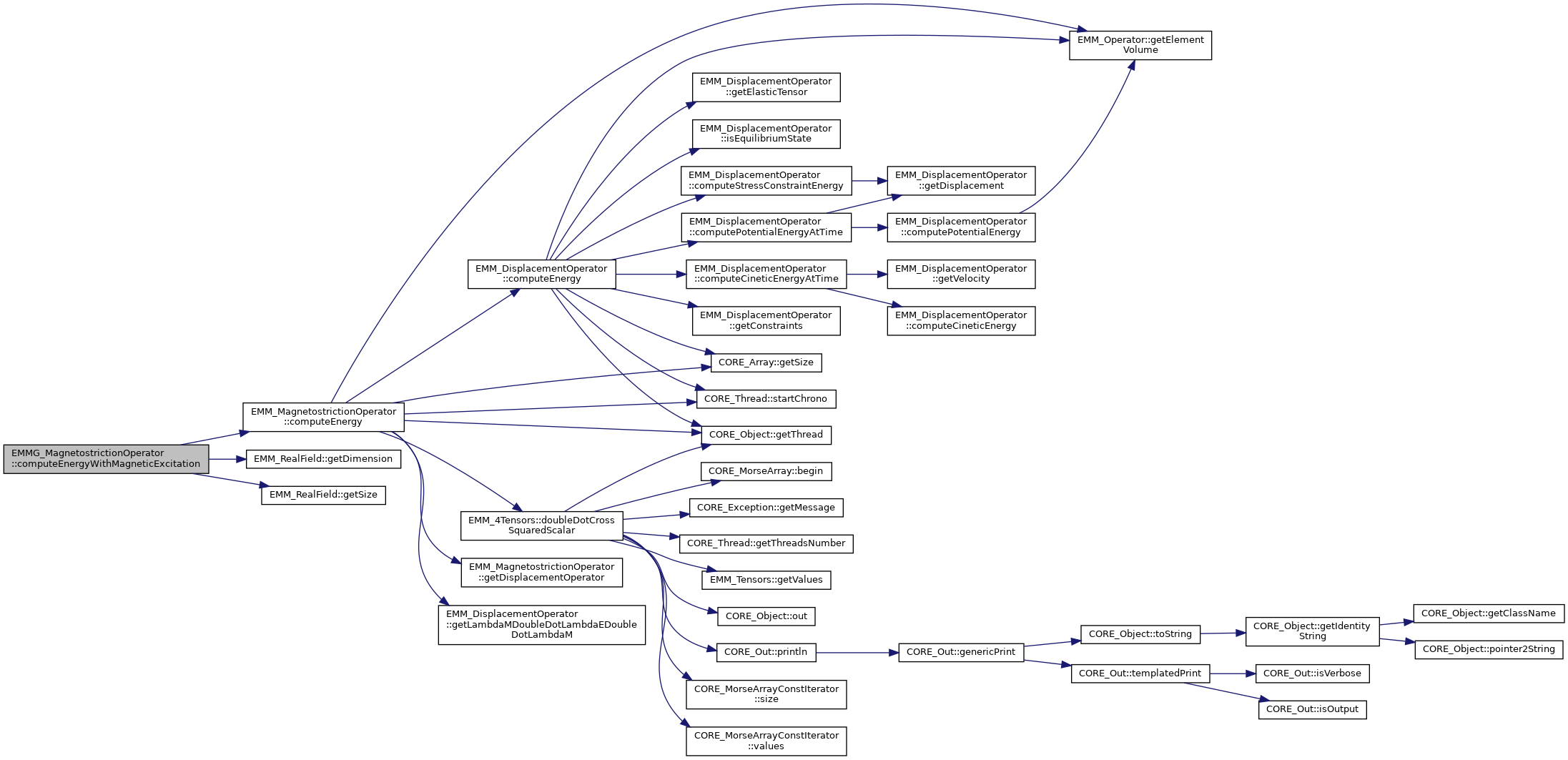
◆ computeEpsilon()
|
inlinestaticinherited |
compute epsilon
- Returns
- the epsilon value eps=10^{-p/3} where p is defined by getEpsilon()=10^{-p}
◆ computeFieldsAtTime()
|
virtualinherited |
compute the fields of operator at time
- Parameters
-
t the time order : order of integration of the fields 1 or 2 sigma the magnetized weight of each cell dM_dt0 the variation of M at time 0 M0 the M at time 0
Implements EMM_Operator.
References EMM_MagnetostrictionOperator::mDisplacementOperator.
Referenced by EMM_MagnetostrictionOperator::getDataField().

◆ computeMagneticExcitationField() [1/2]
|
inlinevirtual |
compute the normalized excitation magnetic field at M
- Parameters
-
sigma the weight of the normalized magnetization for each cell M normalized magnetization field H return excitation magnetic field
Implements EMM_MagneticExcitationOperator.
References EMM_MagnetostrictionOperator::computeMagneticExcitationField(), EMM_RealField::getDimension(), EMM_RealField::getSize(), null, EMM_RealField::setSize(), tDimension, and tUIndex.
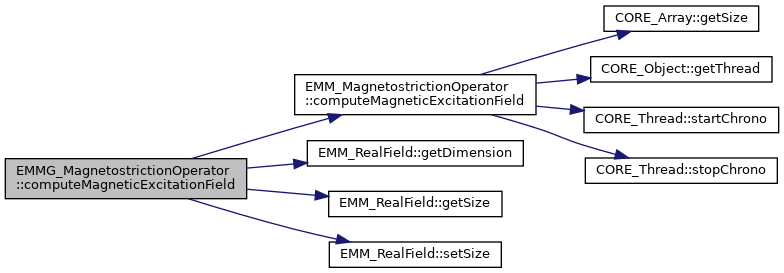
◆ computeMagneticExcitationField() [2/2]
|
protectedvirtualinherited |
compute the normalized excitation magnetic field at M
- Parameters
-
nCells : number of cells dim dimension of each point of mesh sigma the weight of the normalized magnetization for each cell M normalized magnetization field H return excitation magnetic field
It computes when u is the current displacement
![$ \displaystyle h_m(m)=\left [ \tilde \lambda^m : \left \{ \tilde \lambda^e:\epsilon(u) - \sigma(x)^2 \tilde \lambda^e:\left ( \tilde \lambda^m: m \otimes m \right ) \right \} \right ]. \sigma(x) m $](form_1168.png) .
.
 .
.
- m is the normalized magnetism at cell i,
 is the t-coordinate of m at cell i
is the t-coordinate of m at cell i when
when  is the r-coordinate of u within the cell i
is the r-coordinate of u within the cell i
The algorithm to compute H is as follow:
 is the displacement
is the displacement is the magnetism field for gradient computing
is the magnetism field for gradient computing is the magnetism field for gradient computing
is the magnetism field for gradient computing is the magnetism field
is the magnetism field
 of size 3x3x3x3
of size 3x3x3x3 of size 3x3x3x3
of size 3x3x3x3![$ M_i=m[iCell][0]$](form_1176.png)
![$ Ml_i=M^l[iCell][0]$](form_1177.png) of size 3
of size 3![$ Mm_i=M^m[iCell][0]$](form_1178.png) of size 3
of size 3![$ H[iCell][]={0,0,0} $](form_1179.png) of size 3
of size 3 [][]=MM_DisplacementOperator::computeElasticTensor(iCell) of size 3x3
[][]=MM_DisplacementOperator::computeElasticTensor(iCell) of size 3x3



![$ \tilde \lambda^m=\tilde \lambda^m[p][q][m][l] $](form_1185.png)
- c=0


![$ H[iCell][p]+=Hg_{pq}*M_i[q] $](form_1194.png)
References CORE_Array< T >::getSize(), CORE_Object::getThread(), EMM_MagnetostrictionOperator::mDisplacementOperator, EMM_MagnetostrictionOperator::mMagneticExcitationAdimensionizedParameter, CORE_Thread::startChrono(), CORE_Thread::stopChrono(), tBoolean, and tReal.
Referenced by EMM_MagnetostrictionOperator::adimensionize(), and computeMagneticExcitationField().
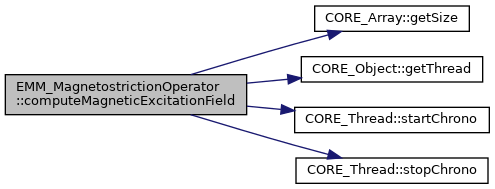

◆ computeMagneticExcitationFieldAndEnergy()
|
inlineinherited |
compute the energy of the operator
- Parameters
-
t time in [0,dt[ where dt will be the next time step sigma weight of each cell Mt the magnetization field Ht the return magnetic excitation field
- Returns
- the energy
- compute Ht=H(Mt)
- compute energy of the operator
References EMM_MagneticExcitationOperator::computeEnergy(), EMM_MagneticExcitationOperator::computeEnergyWithMagneticExcitation(), EMM_MagneticExcitationOperator::computeMagneticExcitationField(), and tReal.
Referenced by EMM_MagneticExcitationLinearOperator::computeEnergy(), and EMMG_AnisotropyOperator::computeEnergy().


◆ computeMagneticExcitationFieldGradient() [1/2]
|
inlinevirtual |
compute the gradient of the magnetic excitation field at M in the direction D
- Parameters
-
sigma the weight of each cell M the magnetization field D the gradient direction gradH : the return gradient of the magnetic excitation field at M in the direction D
- Returns
- true if the gradient is not null
Implements EMM_MagneticExcitationOperator.
◆ computeMagneticExcitationFieldGradient() [2/2]
|
inlinevirtualinherited |
compute the gradient of the magnetic excitation field at M in the direction D
- Parameters
-
nCells : number of cells dim dimension of each point of mesh sigma the weight of each cell M the magnetization field values D the gradient direction values gradH : the return gradient of the magnetic excitation field at M in the direction D values
- Returns
- true if the gradient is not null
References EMM_MagnetostrictionOperator::computeEnergy(), tDimension, EMM_MagnetostrictionOperator::toString(), tReal, tString, and tUIndex.
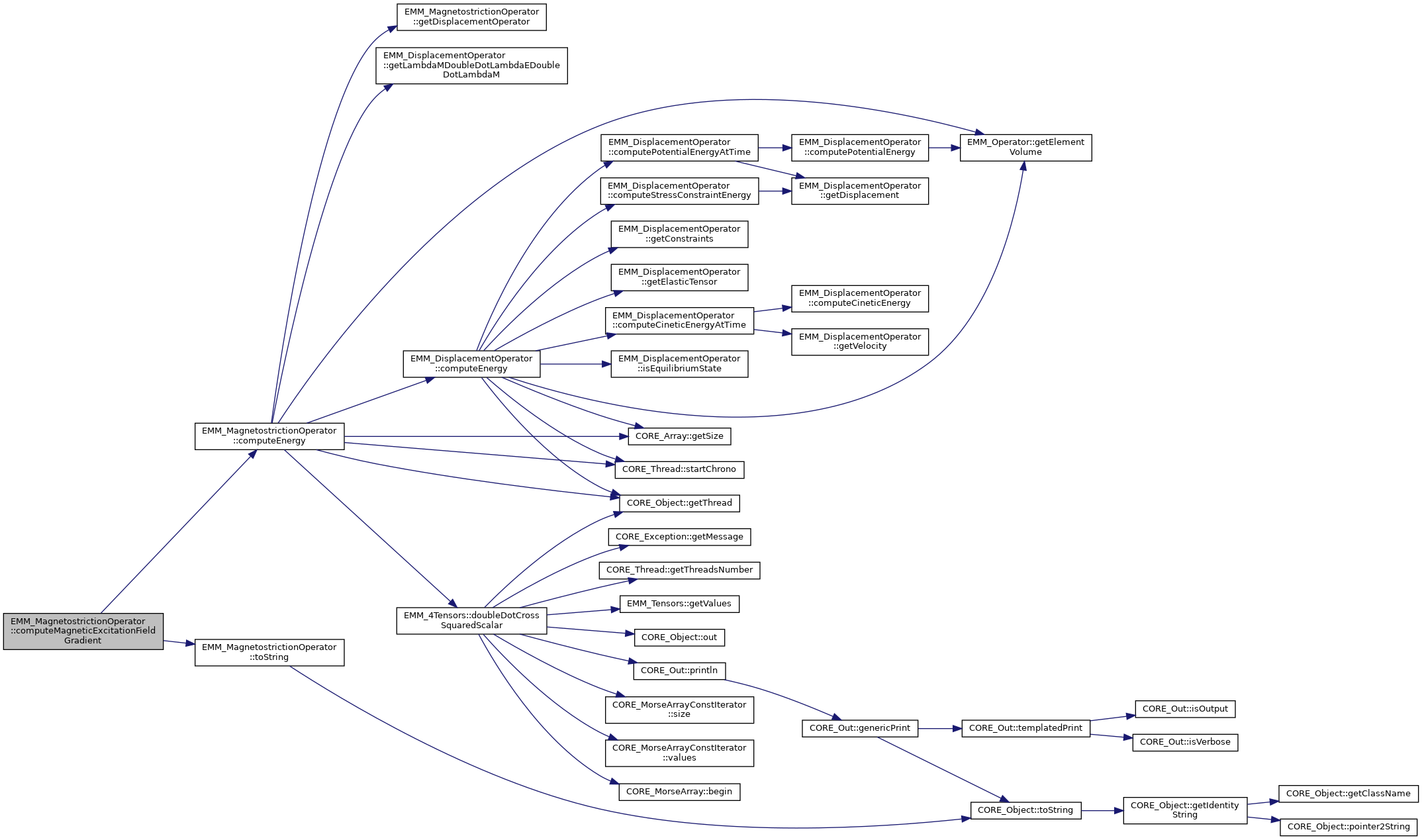
◆ discretize()
|
virtualinherited |
discretize and initialize the operator depending on method
- Parameters
-
system landau lifschitz system used to discretize the operator
- Returns
- true if the discretization succeeds
- compute
 ,
,  ,
, 
- call EMM_DisplacementOperator::discretize()
- compute elastic tensor

Reimplemented from EMM_Operator.
References EMM_Operator::discretize(), EMM_MagnetostrictionOperator::mDisplacementOperator, null, CORE_Object::out(), CORE_Out::println(), and tReal.
Referenced by EMM_MagnetostrictionOperator::adimensionize().


◆ getClassName() [1/2]
|
inherited |
return the class name of the object
- Returns
- the class name of the object
References tString.
Referenced by CORE_Object::getIdentityString(), EMM_Operator::getName(), and CORE_Object::isMemoryChecked().

◆ getClassName() [2/2]
return the class name of the object
- Parameters
-
identityString the identity string of the object
- Returns
- the class name
◆ getDataField() [1/3]
|
inlinevirtualinherited |
get the data field at index for saving data in vtk,txt,... files.
- Parameters
-
index index of the field in [0,getDataFieldsNumber()[ dataName name of the field n number of element of the field dim dimension of the field in [1,3[ values values of the field
- Returns
- true if the field at index exists
Reimplemented from EMM_Operator.
◆ getDataField() [2/3]
|
inlinevirtualinherited |
get the data field at index for saving data in vtk,txt,... files.
- Parameters
-
index index of the field in [0,getDataFieldsNumber()[ dataName name of the field n number of element of the field dim dimension of the field in [1,3[ values values of the field
- Returns
- true if the field at index exists
Reimplemented from EMM_Operator.
◆ getDataField() [3/3]
|
inlinevirtualinherited |
get the data field at index for saving data in vtk,txt,... files.
- Parameters
-
index index of the field in [0,getDataFieldsNumber()[ dataName name of the field n number of element of the field dim dimension of the field in [1,3[ values values of the field
- Returns
- true if the field at index exists
Reimplemented from EMM_Operator.
References EMM_MagnetostrictionOperator::backup(), EMM_MagnetostrictionOperator::computeFieldsAtTime(), EMM_MagnetostrictionOperator::restore(), tBoolean, tFlag, tReal, tString, and EMM_MagnetostrictionOperator::updateAtNextTimeStep().
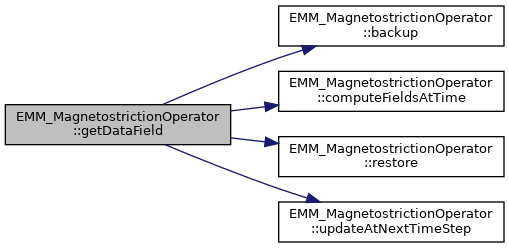
◆ getDataFieldsNumber()
|
inlinevirtualinherited |
get the number of field used in the operator
- Returns
- the number of data
Reimplemented from EMM_Operator.
◆ getDataFieldSpace()
|
inlinevirtualinherited |
get the data field at index for saving data in vtk,txt,... files.
- Parameters
-
index index of the field in [0,getDataFieldsNumber()[ dataName name of the field supportType : mesh element whre the field is applied EMM_Grid3D::ELEMENT; || EMM_Grid3D::POINT dFieldType : type of the field double,float,int,.... n number of element of the field dim dimension of the field in [1,3[
- Returns
- true if the field at index exists
Reimplemented from EMM_Operator.
◆ getDisplacementOperator() [1/2]
|
inlineinherited |
get the displacement operator
- Returns
- the displacement operator
Referenced by EMM_MagnetostrictionOperator::computeEnergy().

◆ getDisplacementOperator() [2/2]
|
inlineinherited |
get the displacement operator
- Returns
- the displacement operator
◆ getDoubleEpsilon()
|
inlinestaticinherited |
get the epsilon value for tDouble type
- Returns
- the epsilon value for tDouble type
Referenced by CORE_Test::testType().
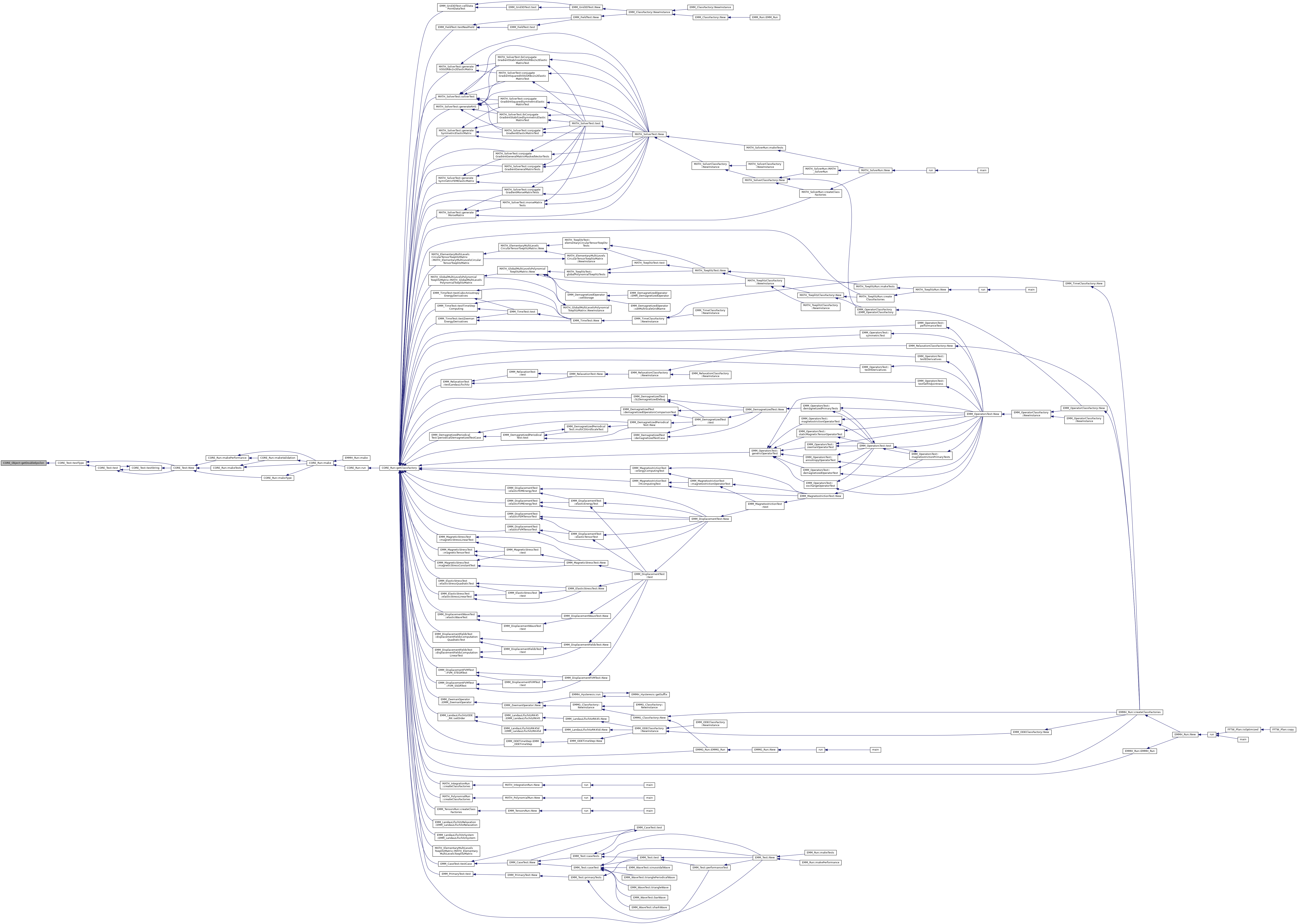
◆ getDoubleInfinity()
|
inlinestaticinherited |
get the infinity value for tFloat type
- Returns
- the intinity value for tFloat type
◆ getElementVolume()
|
inlineinherited |
return the adimensionized volume of the element
- Returns
- the voume of the element with adimensionized dimensions
References EMM_Operator::mElementVolume.
Referenced by EMM_DisplacementFVMOperator::computeCineticEnergy(), EMM_DisplacementFEMOperator::computeElasticStress(), EMM_StaticMagneticTensorOperator::computeEnergy(), EMM_ZeemanOperator::computeEnergy(), EMM_CubicAnisotropyOperator::computeEnergy(), EMM_MagnetostrictionOperator::computeEnergy(), EMM_DisplacementOperator::computeEnergy(), EMM_MagneticExcitationLinearOperator::computeEnergyWithMagneticExcitation(), EMM_AnisotropyOperator::computeEnergyWithMagneticExcitation(), EMM_ZeemanOperator::computeEnergyWithMagneticExcitation(), EMM_DisplacementFEMOperator::computeEquilibriumMatrixDiagonalConditioner(), EMM_DisplacementFEMOperator::computeMagneticStress(), and EMM_DisplacementOperator::computePotentialEnergy().
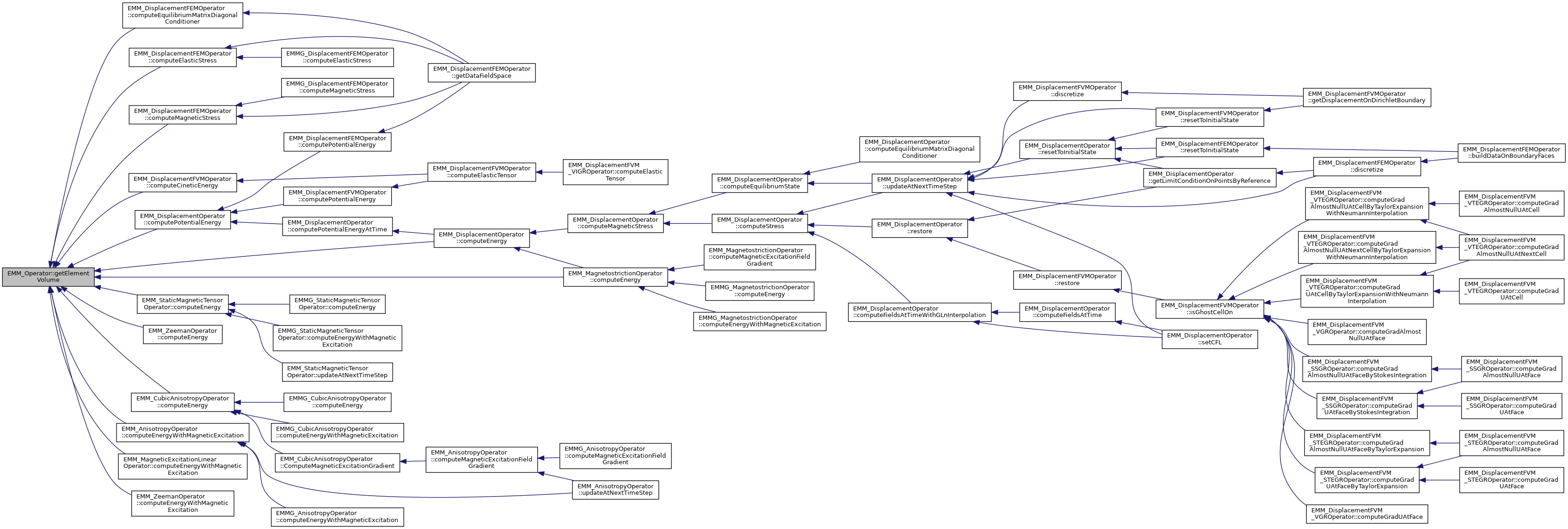
◆ getEpsilon()
|
inlinestaticinherited |
get the epsilon value for T type
- Returns
- the epsilon value for T type
◆ getFloatEpsilon()
|
inlinestaticinherited |
get the epsilon value for tFloat type
- Returns
- the epsilon value for tFloat type
Referenced by CORE_Test::testType().
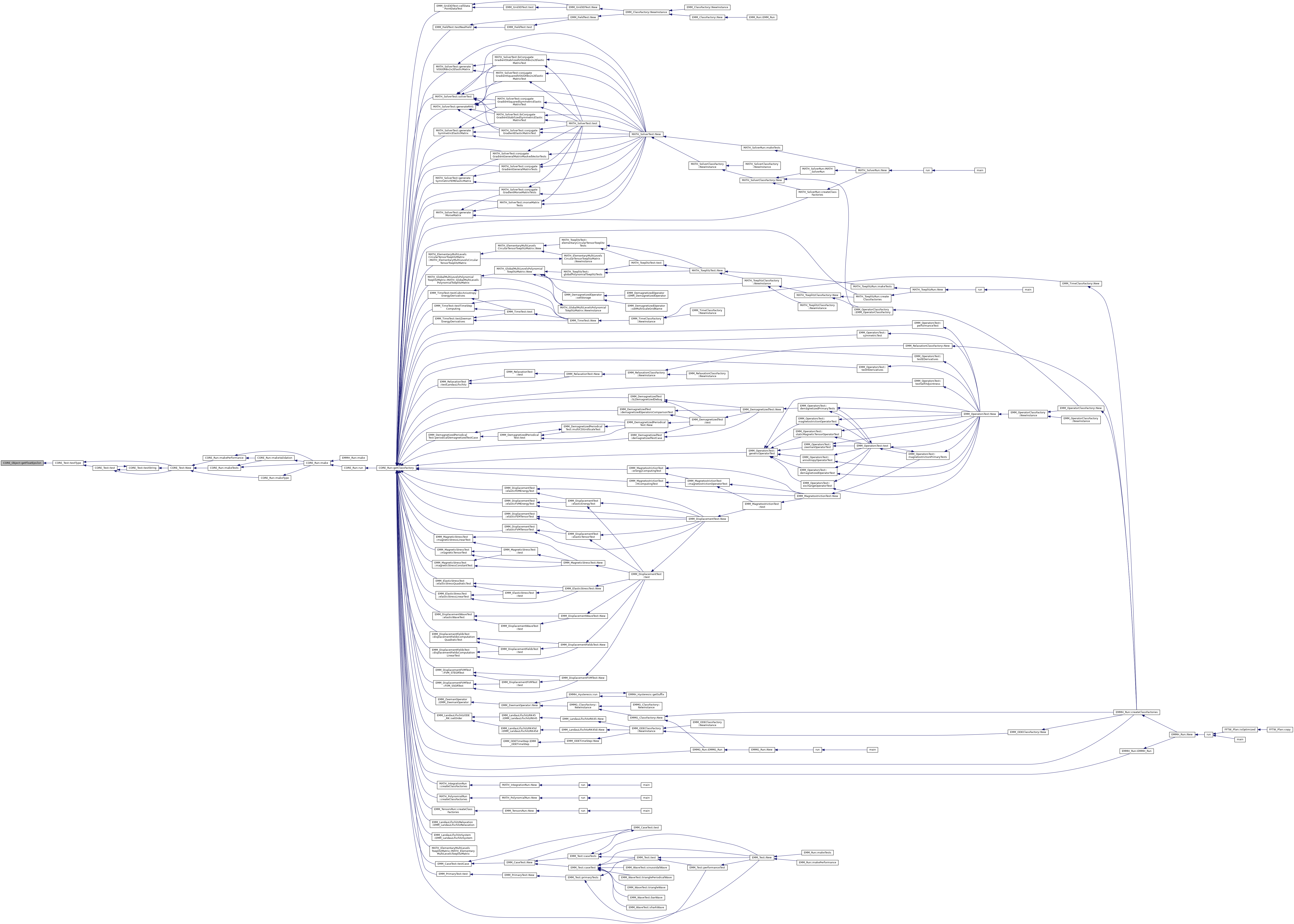
◆ getFloatInfinity()
|
inlinestaticinherited |
get the infinity value for tFloat type
- Returns
- the intinity value for tFloat type
◆ getIdentityString()
|
inlineinherited |
return the identity string of the object of the form className_at_address
- Returns
- the identity string of the object
References CORE_Object::getClassName(), CORE_Object::pointer2String(), and tString.
Referenced by MATH_GaussLegendreIntegration::copy(), EMM_MultiScaleGrid::initialize(), CORE_Object::isInstanceOf(), CORE_Object::printObjectsInMemory(), MATH_Matrix::toString(), EMMG_SLPeriodicMultiScale::toString(), EMM_Stepper::toString(), EMM_AnisotropyDirectionsField::toString(), EMM_BlockMassMatrix::toString(), CORE_Object::toString(), EMM_Tensors::toString(), EMM_MultiScaleGrid::toString(), EMM_MatterField::toString(), EMM_Grid3D::toString(), and EMM_LandauLifschitzSystem::toString().

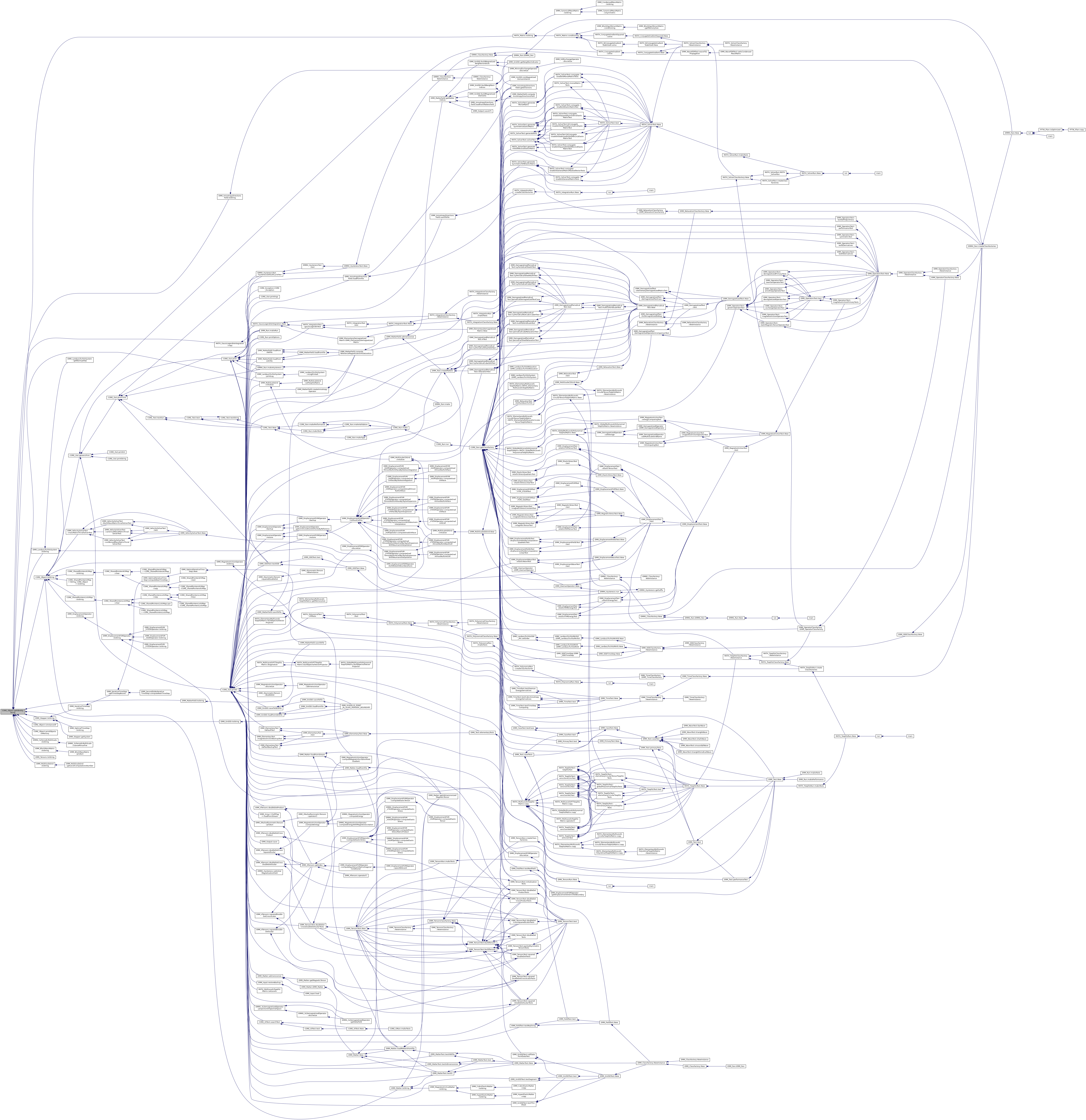
◆ getInfinity()
|
inlinestaticinherited |
get the infinity for T type
- Returns
- the infinity value for T type
◆ getLDoubleEpsilon()
|
inlinestaticinherited |
get the epsilon value for tLDouble type
- Returns
- the epsilon value for tLDouble type
Referenced by CORE_Test::testType().

◆ getLDoubleInfinity()
|
inlinestaticinherited |
get the infinity value for tDouble type
- Returns
- the infinity value for tDouble type
◆ getMaxChar()
|
inlinestaticinherited |
get the max value for tChar type
- Returns
- the max value for tChar type
Referenced by CORE_Test::testType().

◆ getMaxDouble()
|
inlinestaticinherited |
get the max value for tDouble type
- Returns
- the max value for tDouble type
Referenced by CORE_Test::testType().
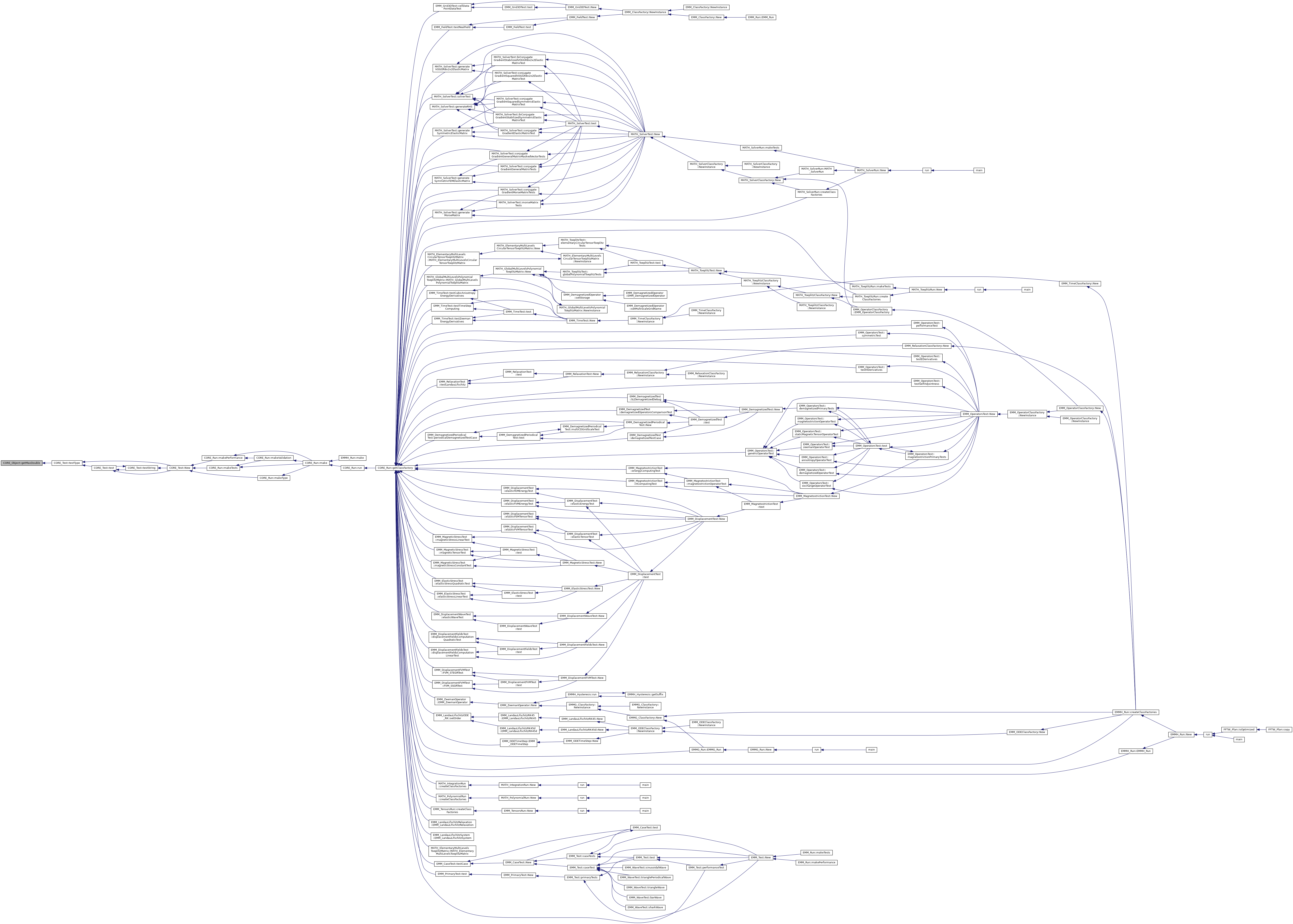
◆ getMaxFlag()
|
inlinestaticinherited |
get the max value for the tFlag type
- Returns
- the max value for the tFlag type
Referenced by CORE_Test::testType().

◆ getMaxFloat()
|
inlinestaticinherited |
get the max value for tFloat type
- Returns
- the max value for tFloat type
Referenced by CORE_Test::testType().
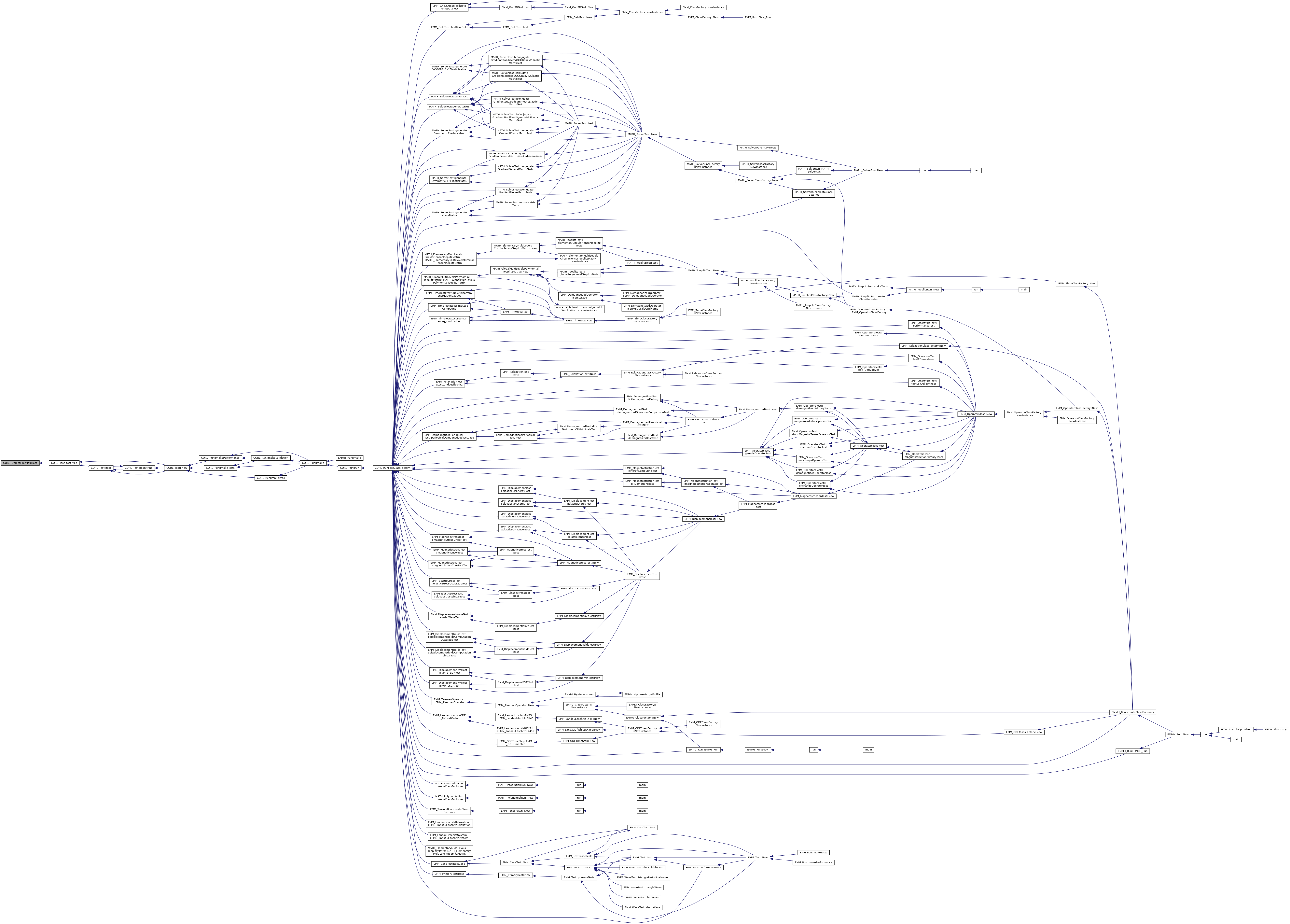
◆ getMaxIndex()
|
inlinestaticinherited |
get the max value for the array/vector indexing type
- Returns
- the max value for the array/vector indexing type
Referenced by CORE_Test::testType().
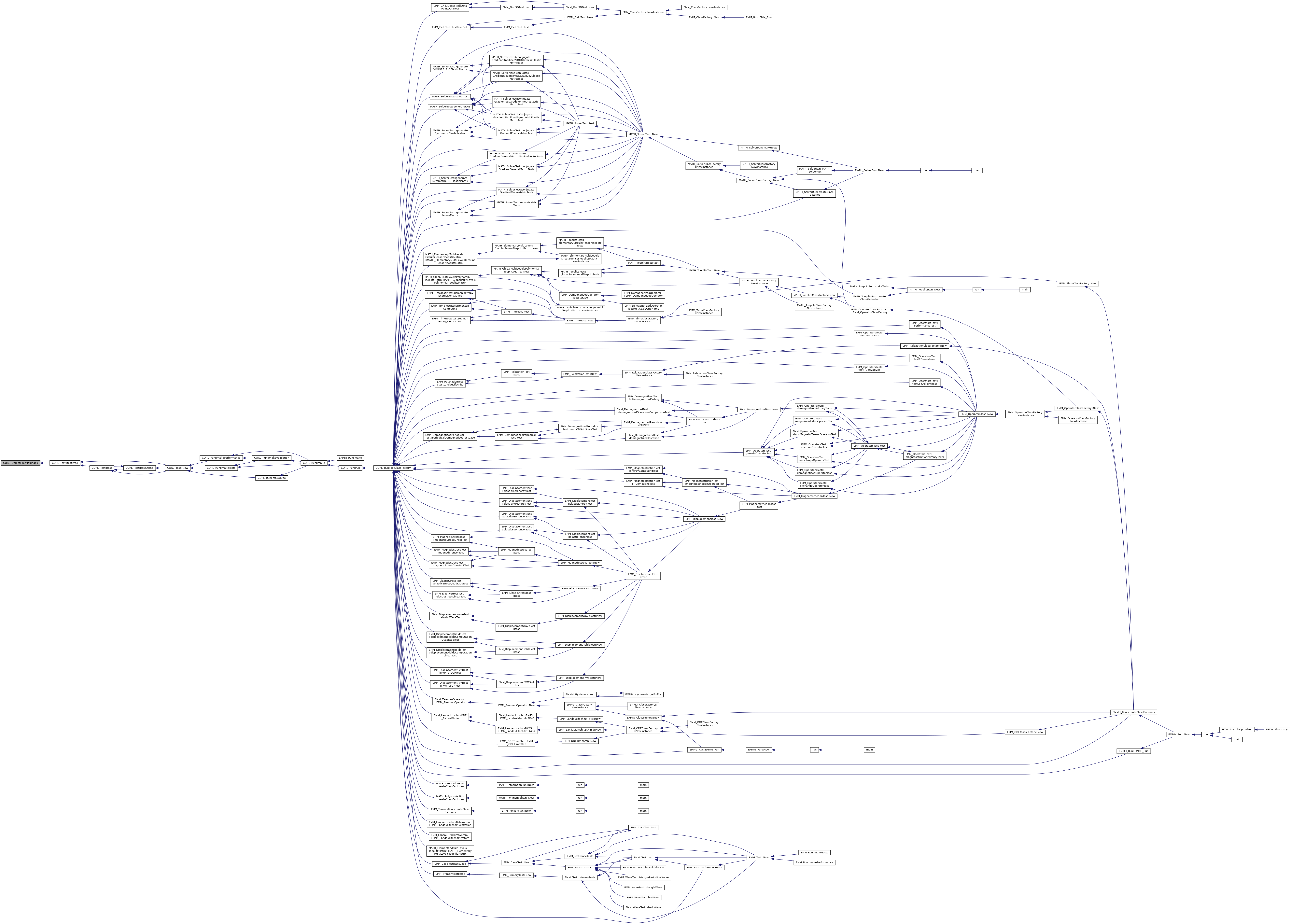
◆ getMaxInt()
|
inlinestaticinherited |
get the max value for tInt type
- Returns
- the max value for tInt type
Referenced by MATSGN_FFT::fastFourierTransform3D_FFTW(), and CORE_Test::testType().

◆ getMaxInteger()
|
inlinestaticinherited |
get the max value for the integer type
- Returns
- the max value for the integer type
Referenced by CORE_Test::testType().
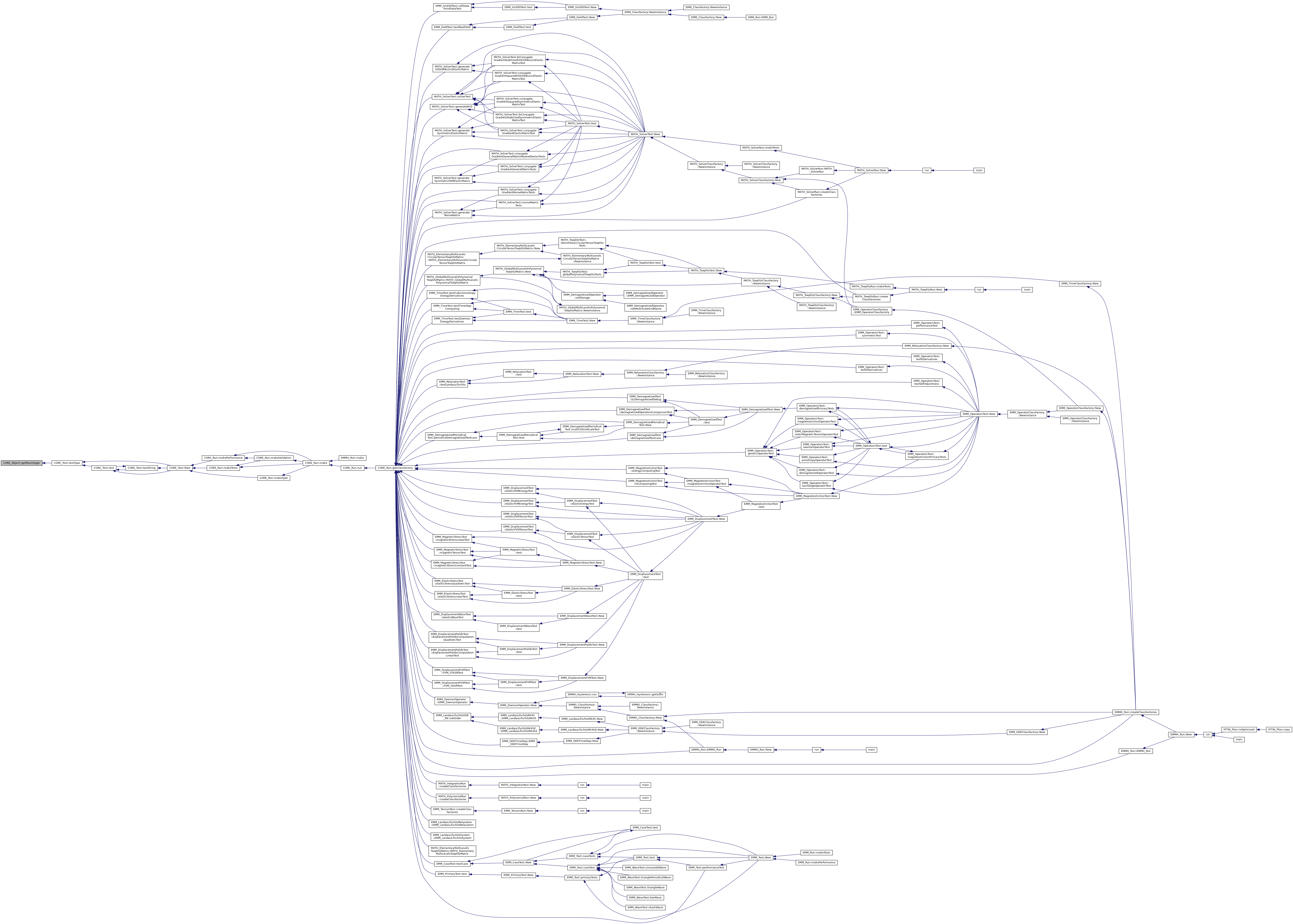
◆ getMaxLDouble()
|
inlinestaticinherited |
get the max value for tLDouble type
- Returns
- the max value for tLDouble type
Referenced by CORE_Test::testType().
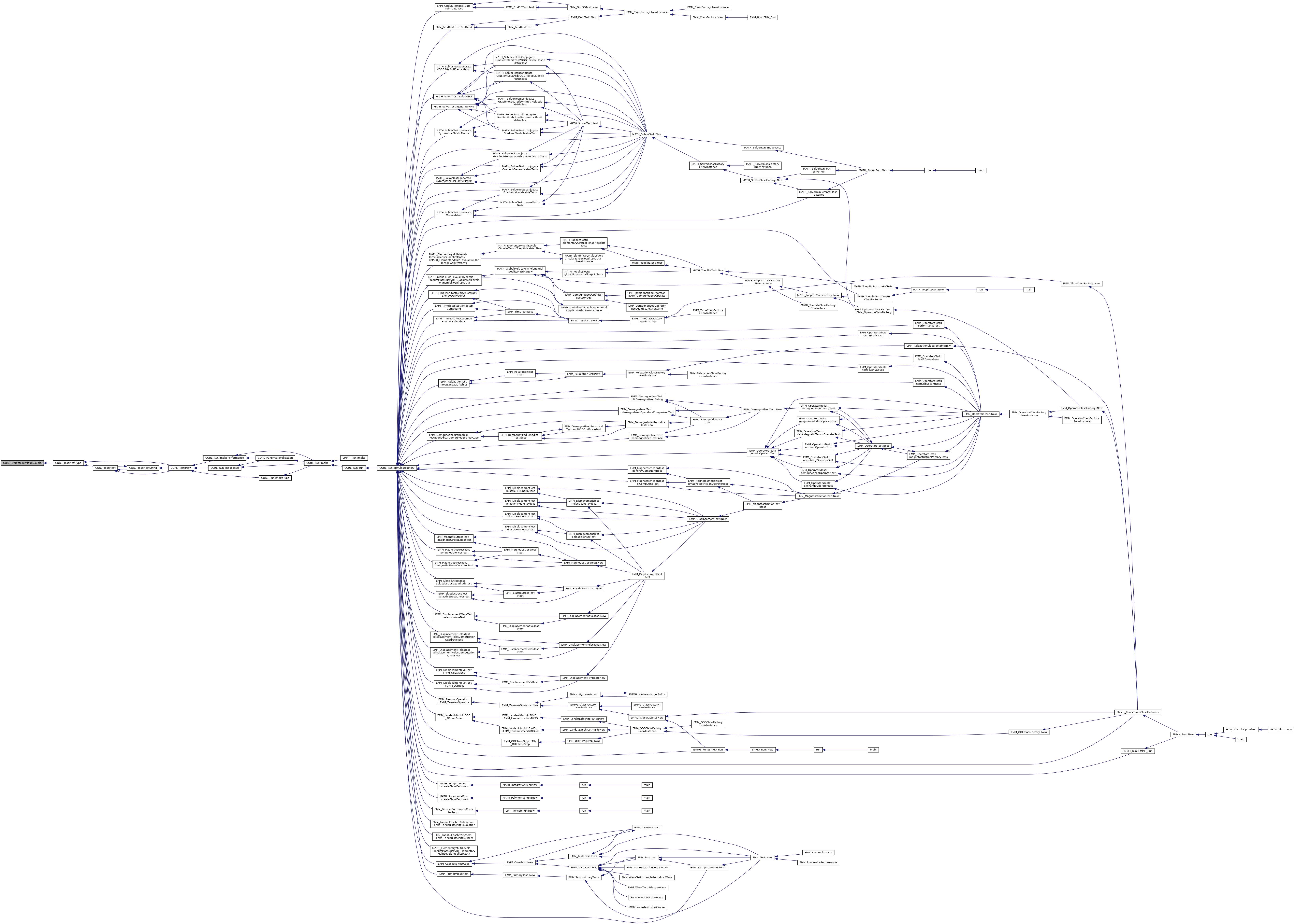
◆ getMaxLInt()
|
inlinestaticinherited |
get the max value for tLInt type
- Returns
- the max value for tLInt type
Referenced by CORE_Test::testType().

◆ getMaxLLInt()
|
inlinestaticinherited |
get the max value for tULInt type
- Returns
- the max value for tULInt type
Referenced by CORE_Test::testType().
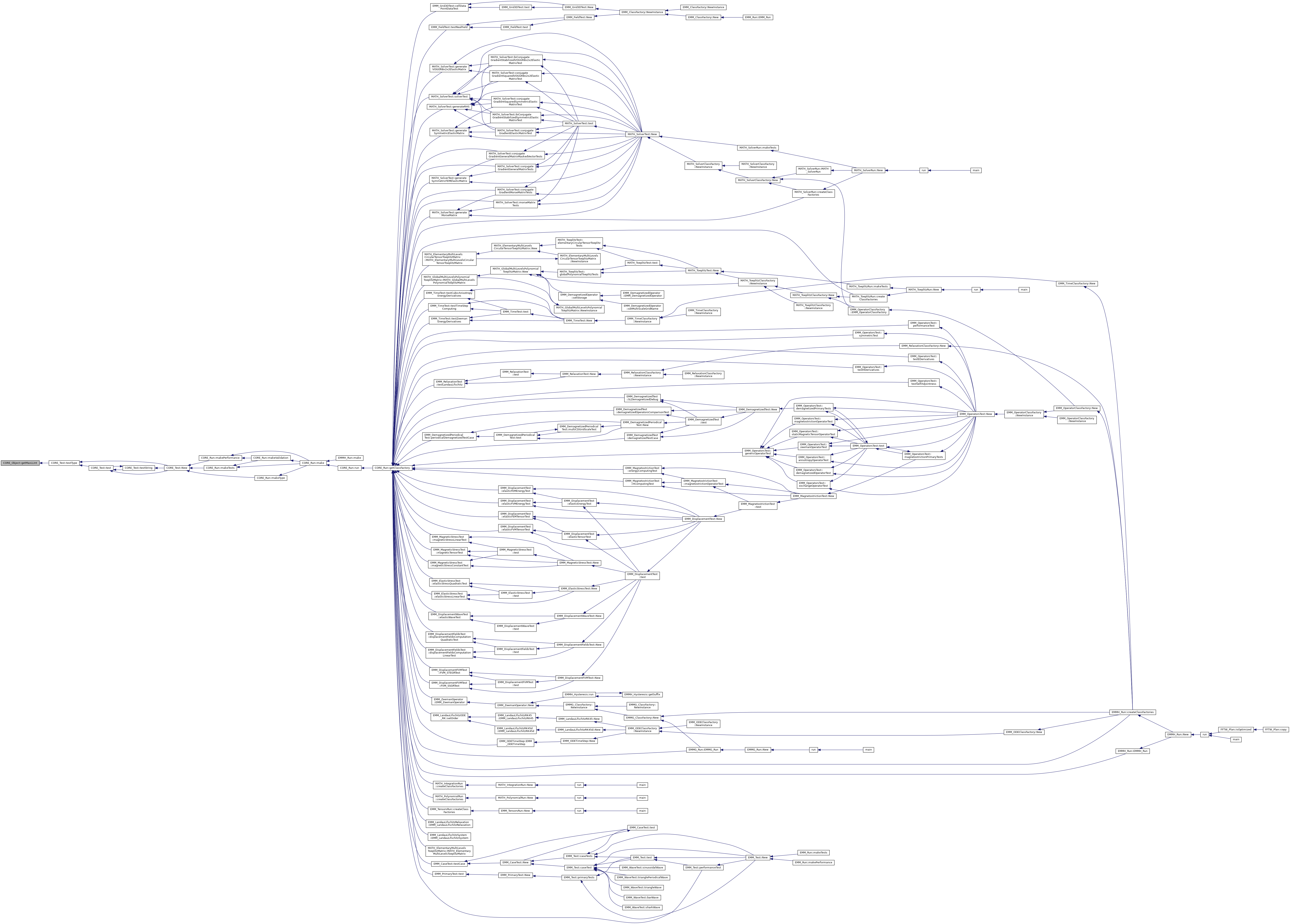
◆ getMaxReal()
|
inlinestaticinherited |
get the max value for the real type
- Returns
- he max value for the real type
Referenced by EMM_MatterField::adimensionize(), and CORE_Test::testType().

◆ getMaxSInt()
|
inlinestaticinherited |
get the max value for tSInt type
- Returns
- the max value for tSInt type
Referenced by CORE_Test::testType().
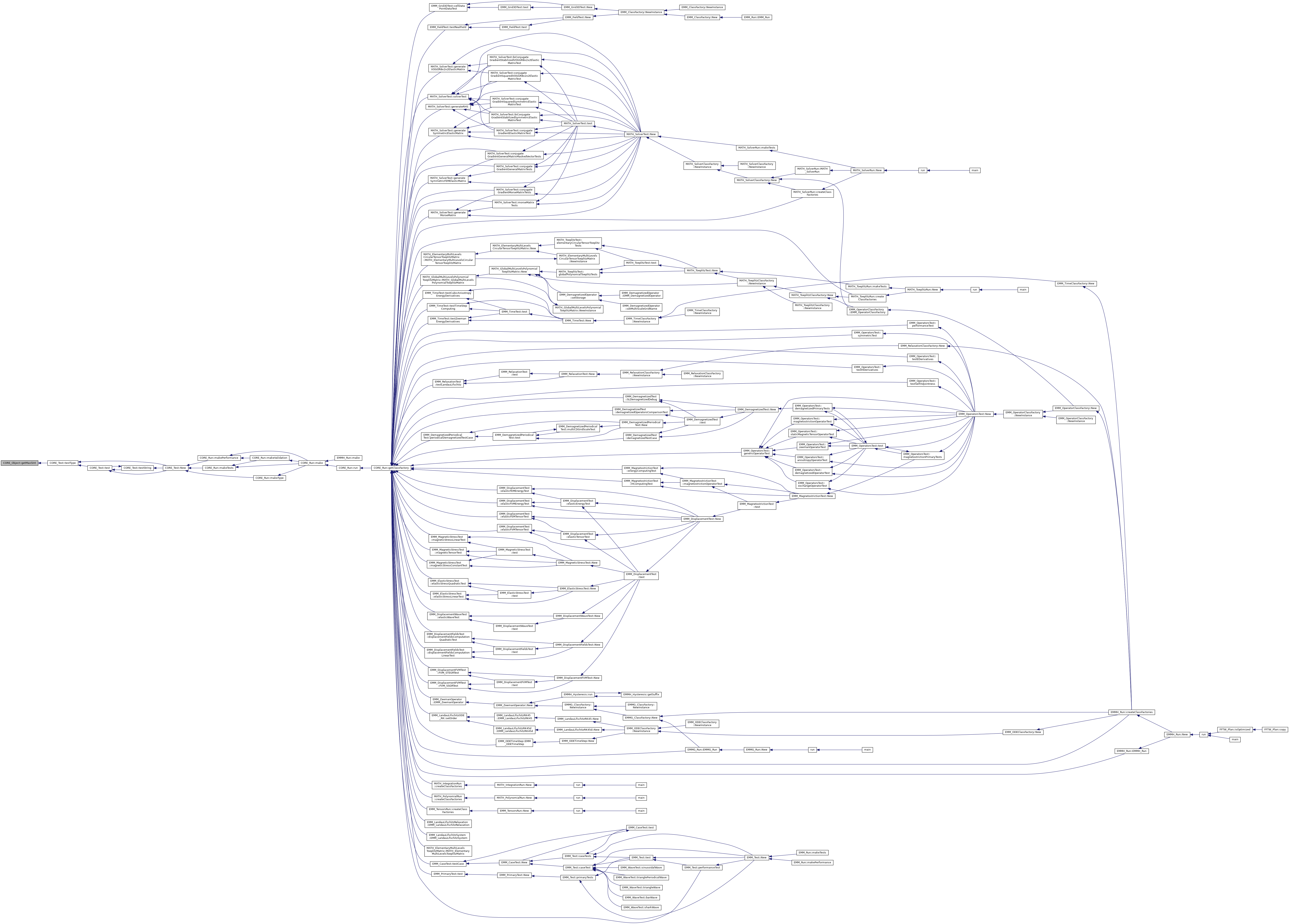
◆ getMaxUChar()
|
inlinestaticinherited |
get the max value for tUChar type
- Returns
- the max value for tUChar type
Referenced by CORE_Test::testType().
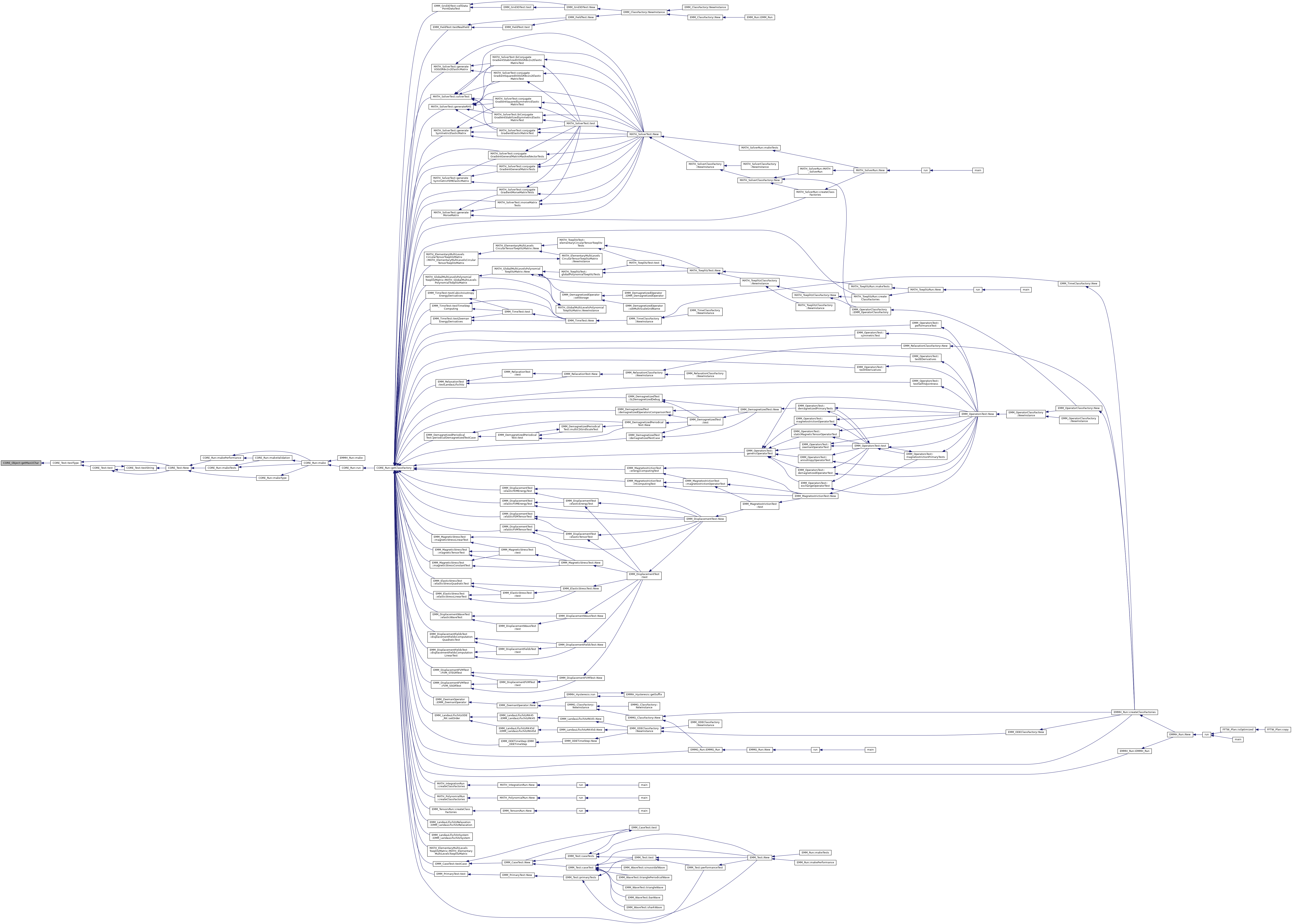
◆ getMaxUIndex()
|
inlinestaticinherited |
get the max value for difference the array/vector indexing type
- Returns
- the max value for difference the array/vector indexing type
Referenced by CORE_Vector< T >::addAfterIndices(), CORE_Vector< T >::search(), CORE_Test::testType(), CORE_Integer::toHexString(), and CORE_Integer::toString().
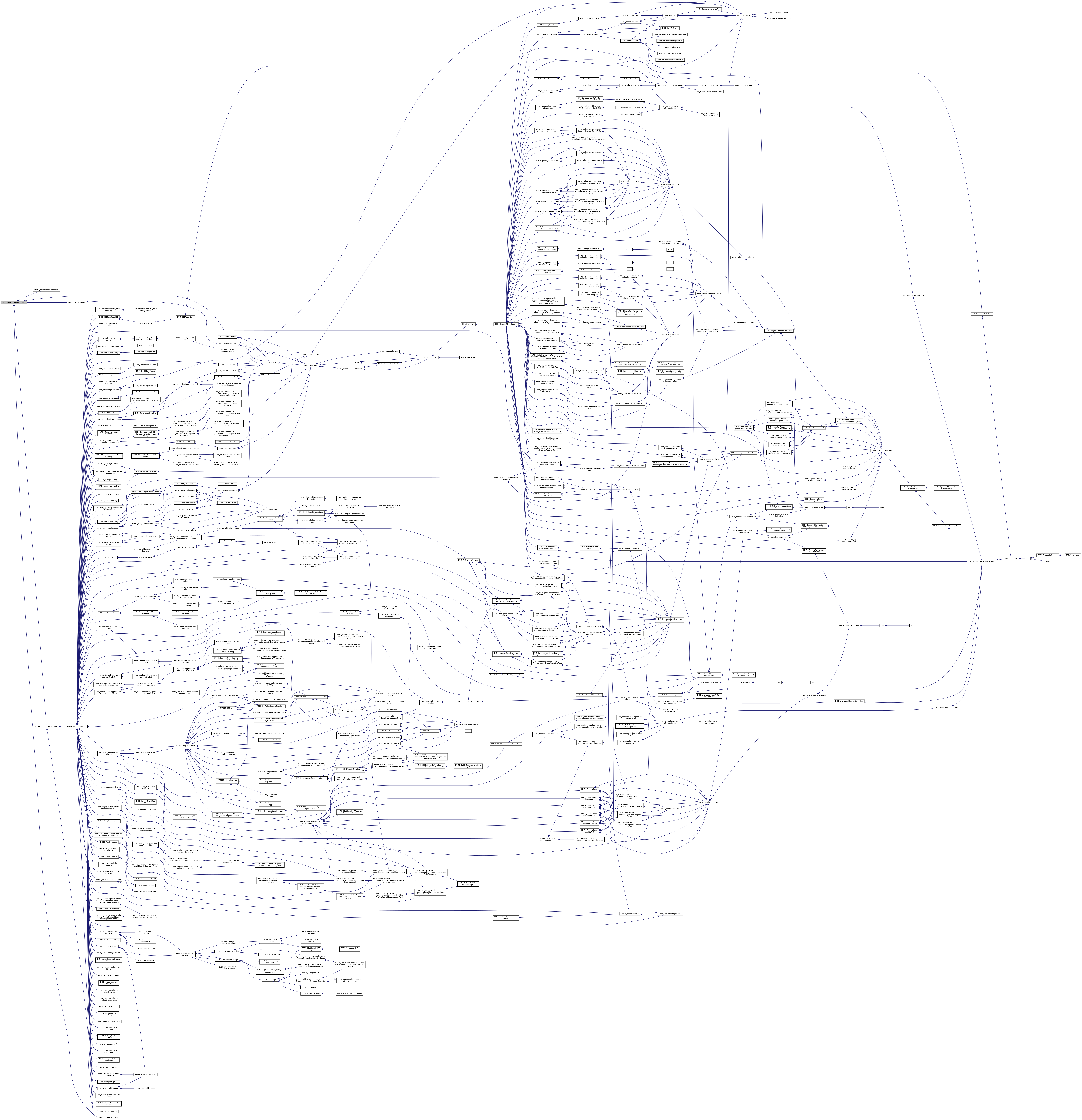
◆ getMaxUInt()
|
inlinestaticinherited |
get the max value for tUInt type
- Returns
- the max value for tUInt type
Referenced by EMM_Array< tCellFlag >::loadFromFile(), EMM_RealField::loadFromFile(), and CORE_Test::testType().

◆ getMaxUInteger()
|
inlinestaticinherited |
get the max value for the unsigned integer type
- Returns
- the max value for the unsigned integer type
Referenced by MATH_Pn::computeExtrenums(), EMM_MultiScaleGrid::computeLevelsNumber(), EMM_Input::restoreBackup(), MATH_P0::solve(), and CORE_Test::testType().

◆ getMaxULInt()
|
inlinestaticinherited |
get the max value for tULInt type
- Returns
- the max value for tULInt type
Referenced by CORE_Test::testType().
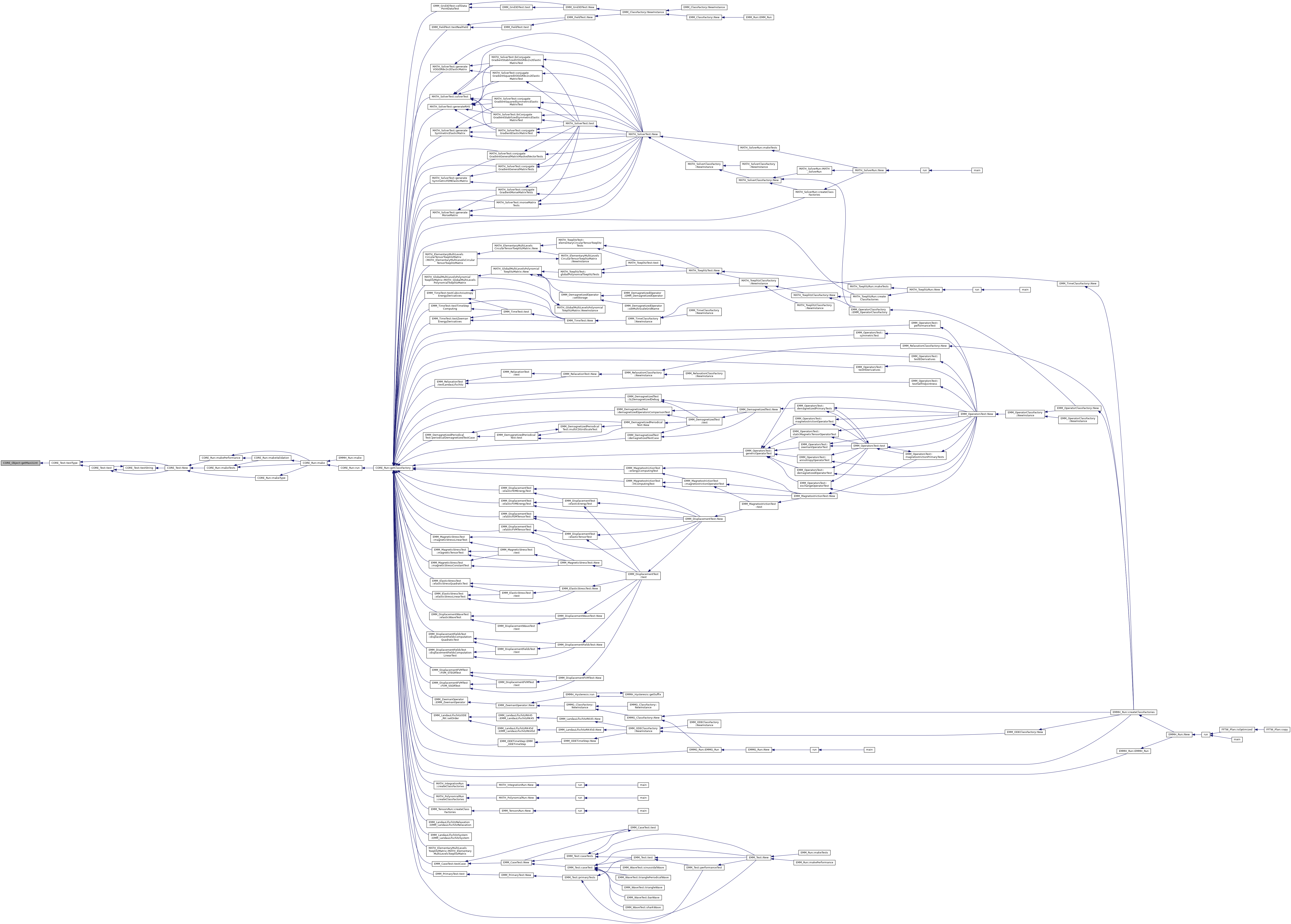
◆ getMaxULLInt()
|
inlinestaticinherited |
get the max value for tULLInt type
- Returns
- the max value for tULLInt type
Referenced by CORE_Test::testType().
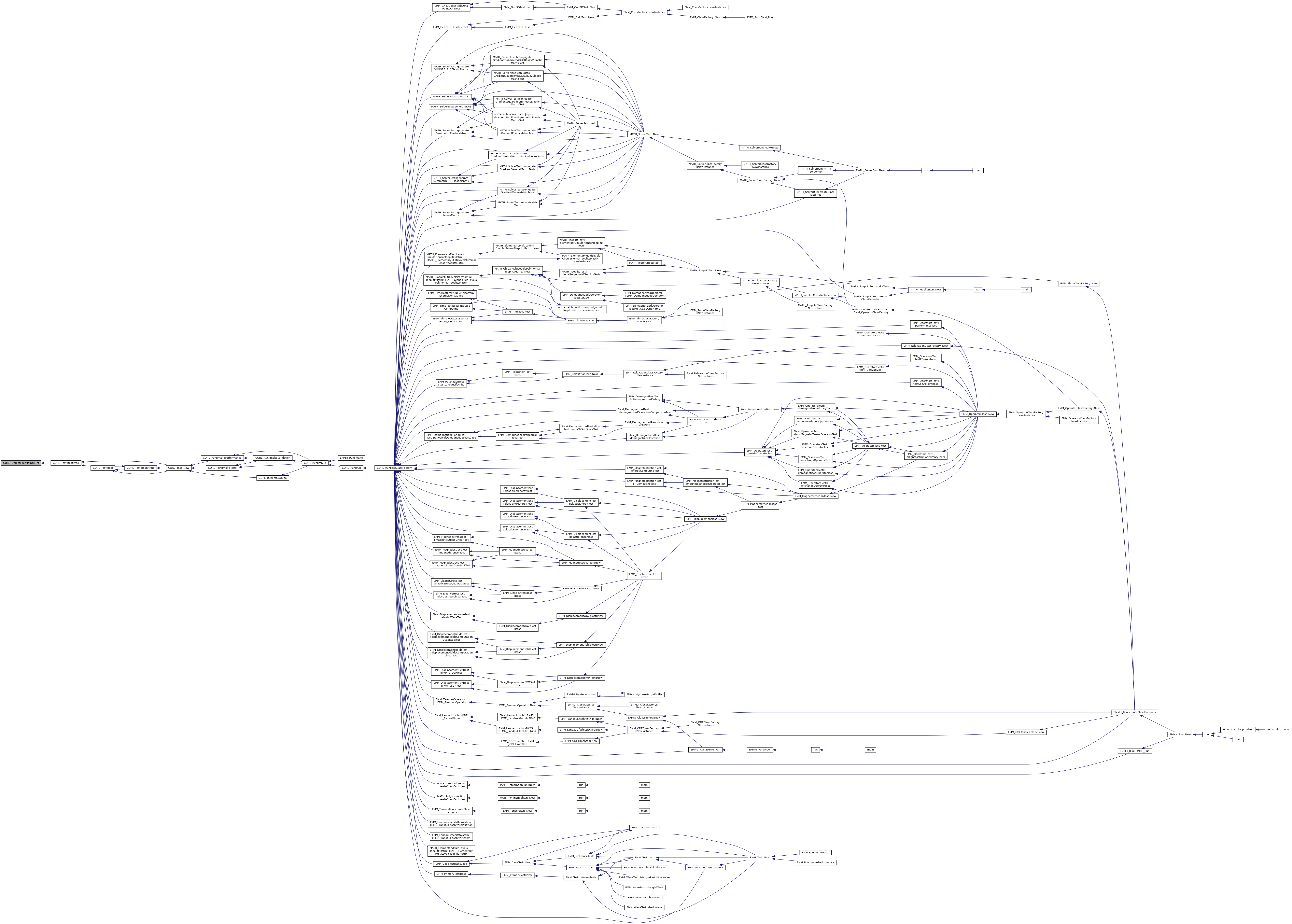
◆ getMaxUSInt()
|
inlinestaticinherited |
get the max value for tUSInt type
- Returns
- the max value for tUSInt type
Referenced by CORE_Test::testType().

◆ getMemorySize()
|
inlinevirtualinherited |
return the memory size in byte
- Returns
- the memory size of the storage in bytes 1 Kb = 1024 bytes 1 Mb = 1024 Kb 1 Gb = 1024 Mb 1 Tb = 1024 Gb 1 Hb = 1024 Tb
Reimplemented from EMM_Operator.
References EMM_Operator::getMemorySize().

◆ getMinChar()
|
inlinestaticinherited |
get the min value for tChar type
- Returns
- the min value for tChar type
Referenced by CORE_Test::testType().
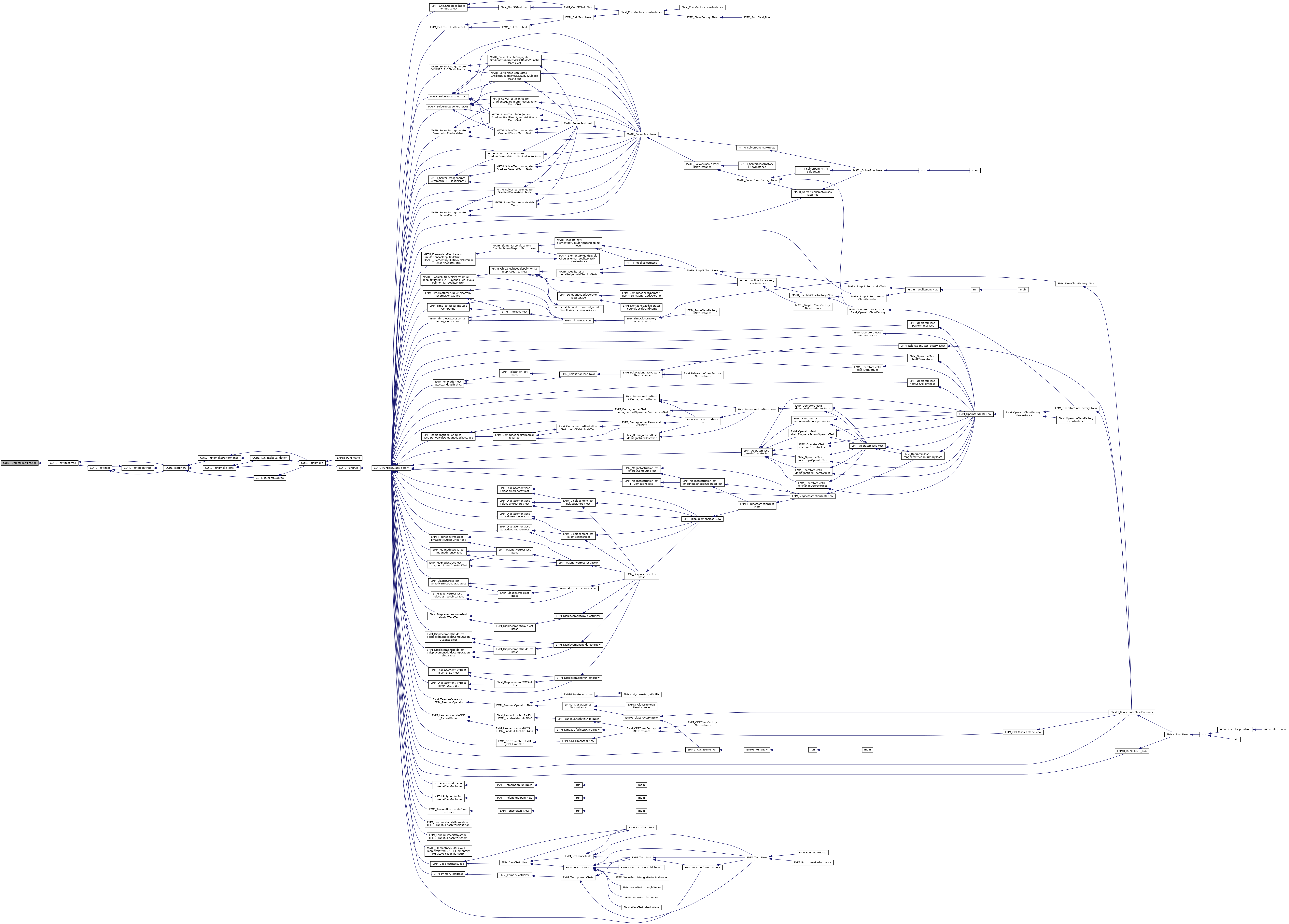
◆ getMinDouble()
|
inlinestaticinherited |
get the min value for tDouble type
- Returns
- the min value for tDouble type
Referenced by CORE_Test::testType().

◆ getMinFlag()
|
inlinestaticinherited |
get the min value for the tFlag type
- Returns
- the min value for the tFlag type
Referenced by CORE_Test::testType().
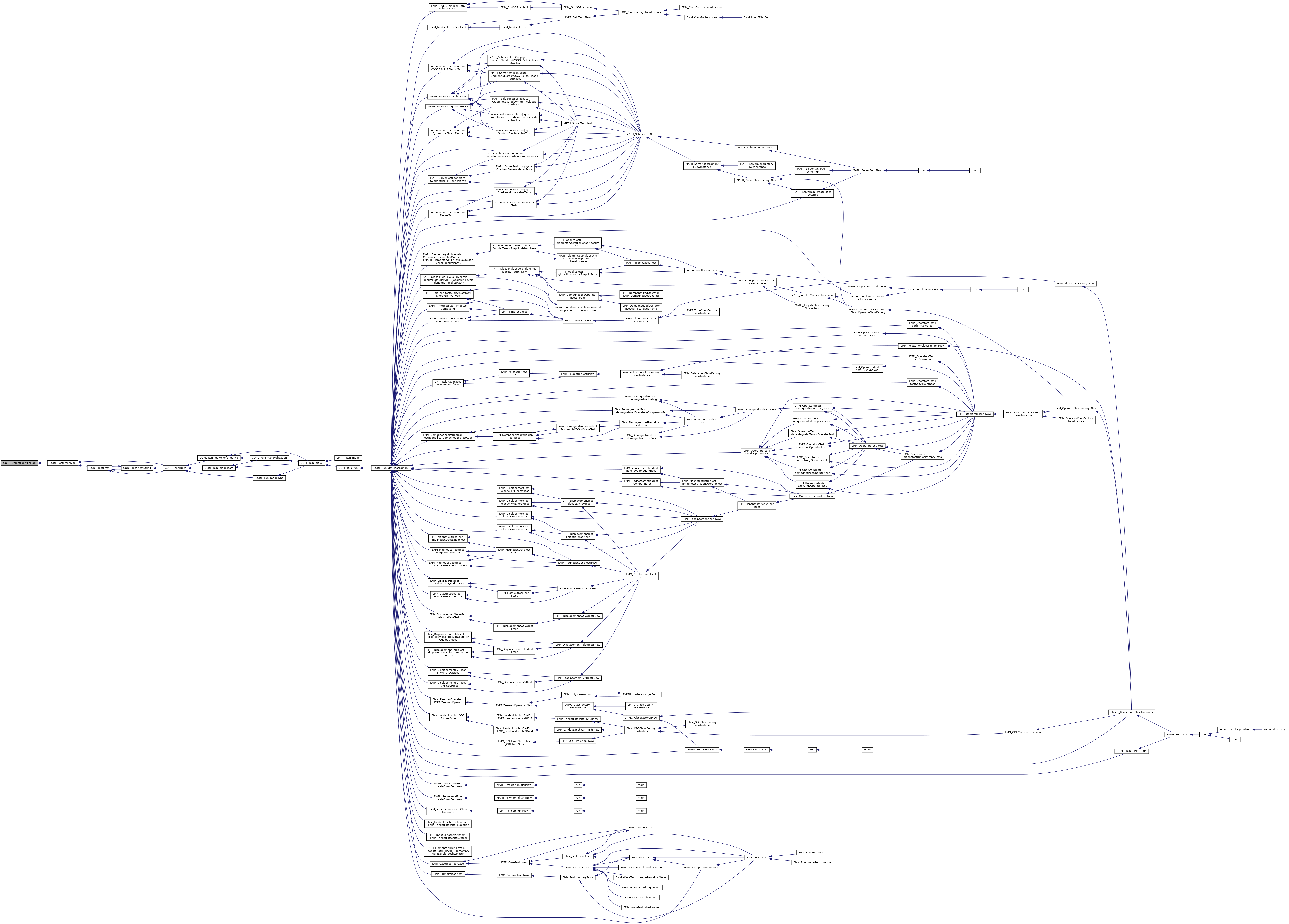
◆ getMinFloat()
|
inlinestaticinherited |
get the min value for tFloat type
- Returns
- the min value for tFloat type
Referenced by CORE_Test::testType().
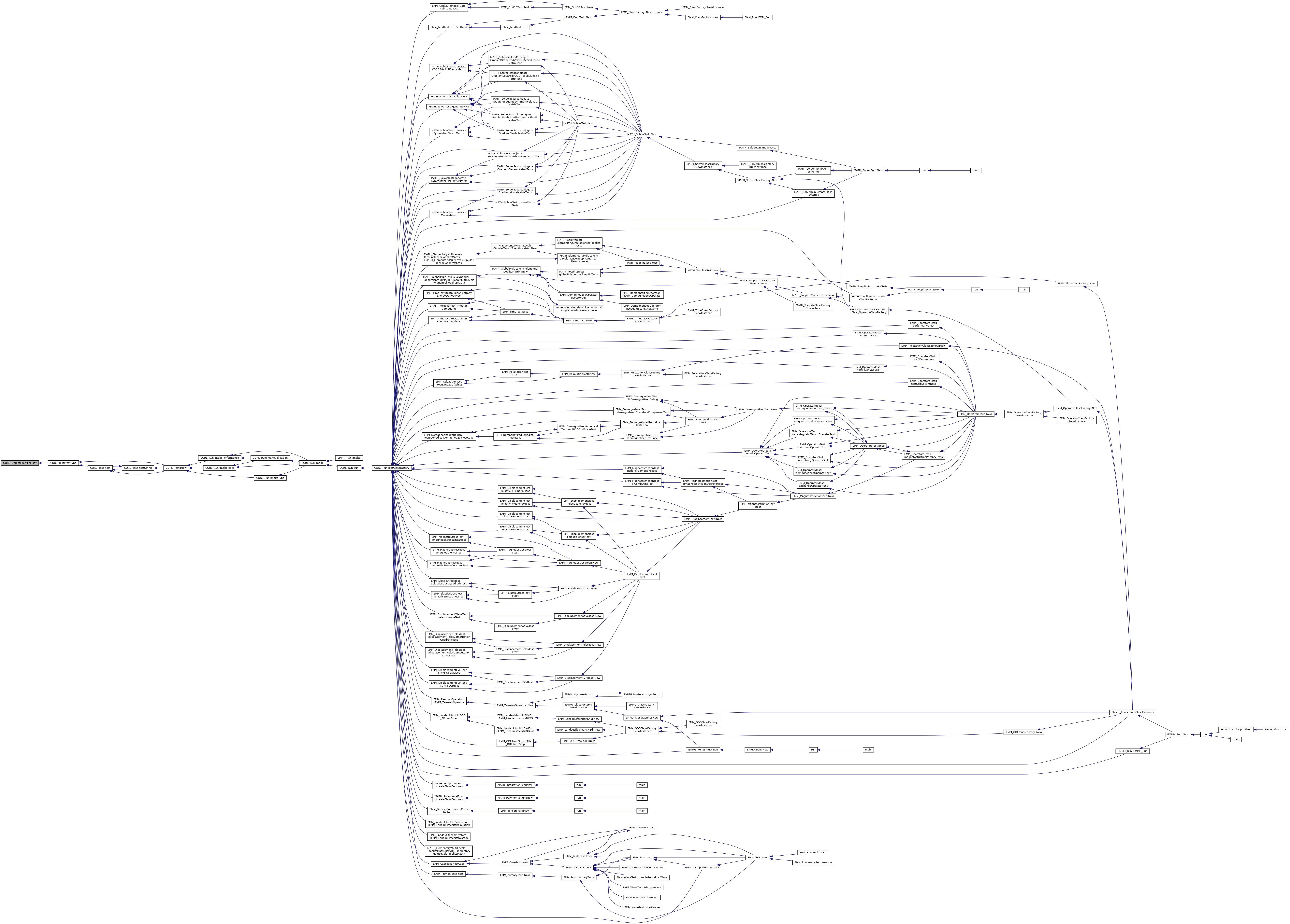
◆ getMinIndex()
|
inlinestaticinherited |
get the min value for the array/vector indexing type
- Returns
- the min value for the array/vector indexing type
Referenced by CORE_Test::testType().
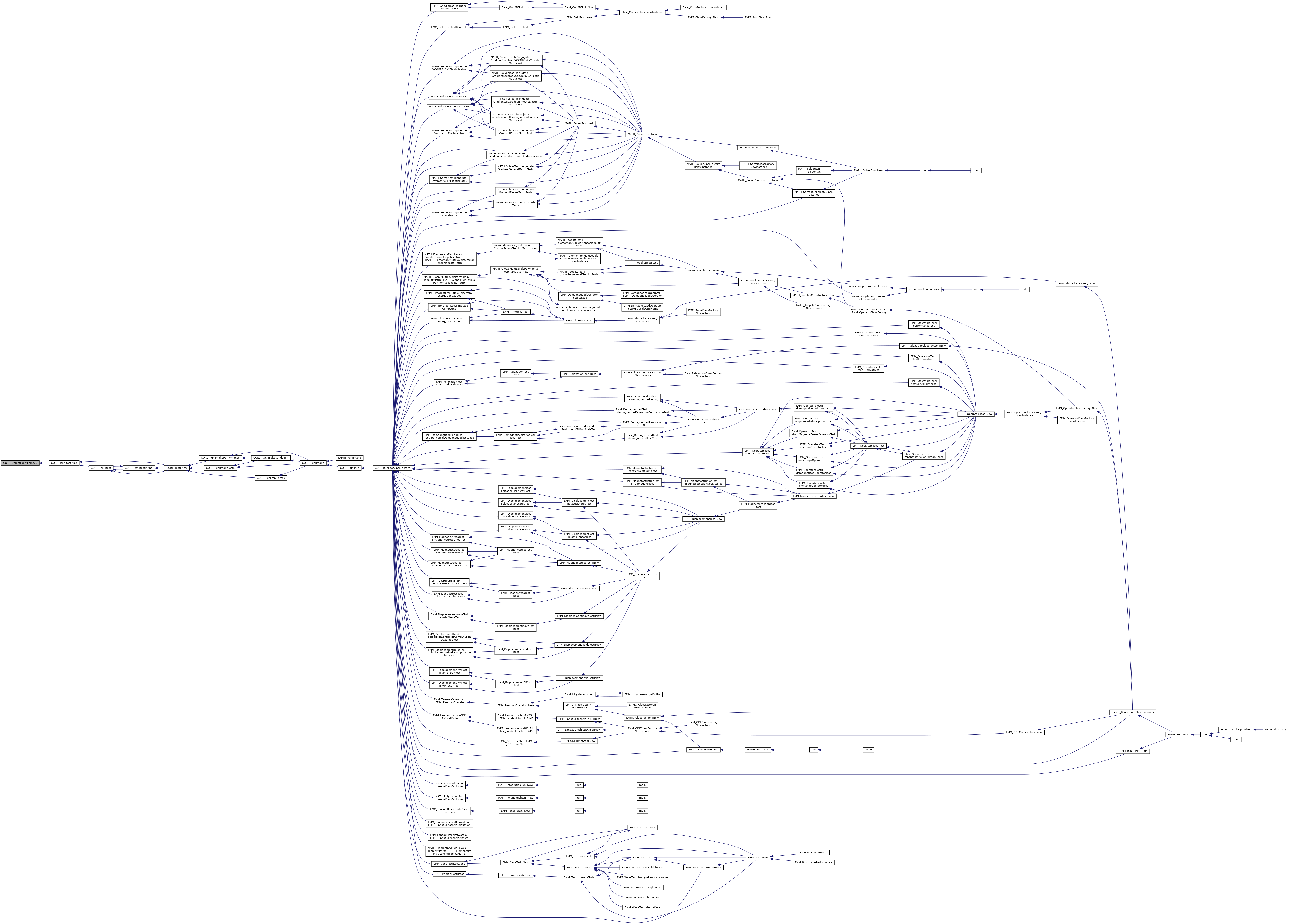
◆ getMinInt()
|
inlinestaticinherited |
get the min value for tInt type
- Returns
- the min value for tInt type
Referenced by CORE_Test::testType().
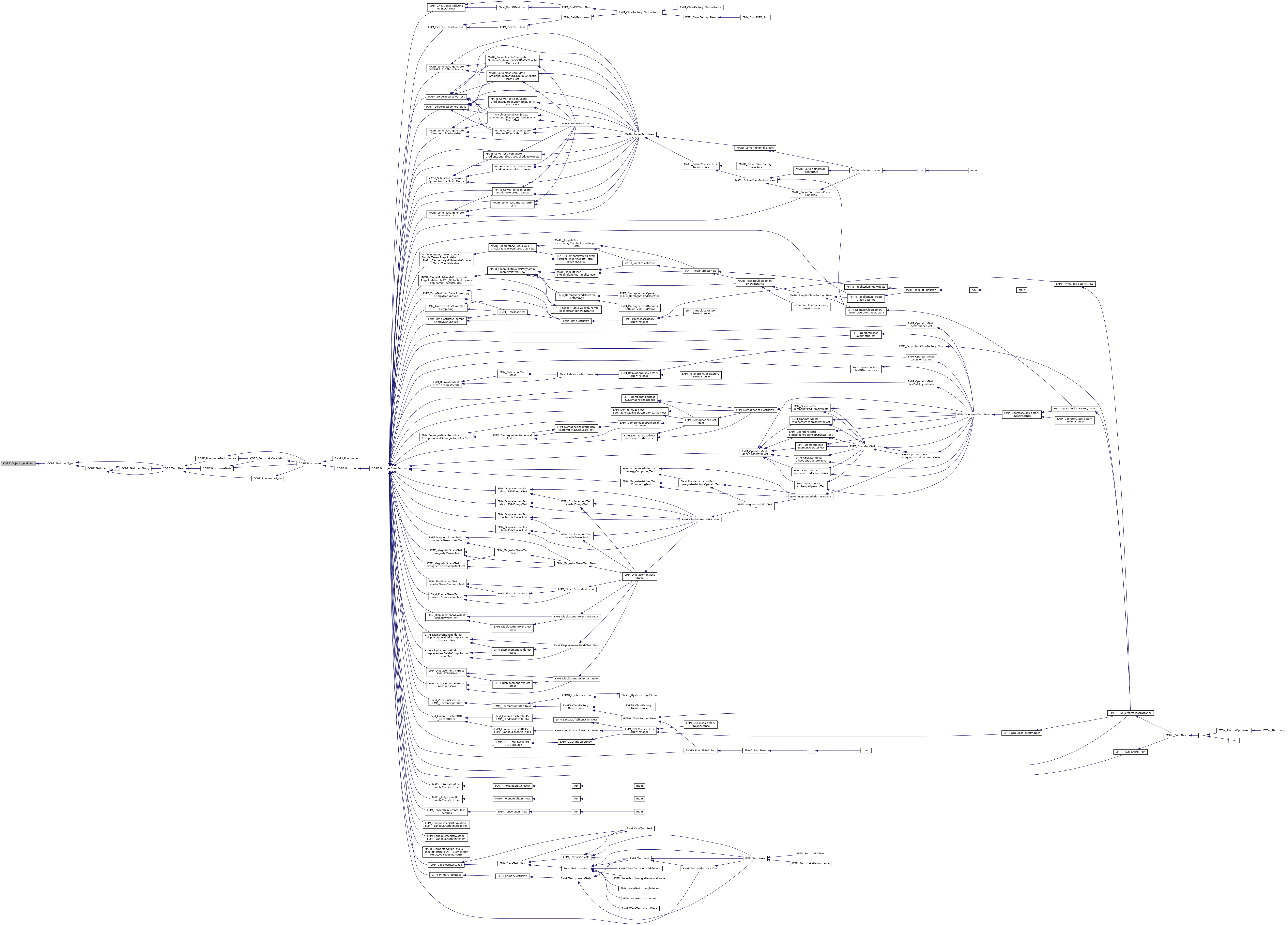
◆ getMinInteger()
|
inlinestaticinherited |
get the min value for the integer type
- Returns
- the minin value for the integer type
Referenced by CORE_Test::testType().

◆ getMinLDouble()
|
inlinestaticinherited |
get the min value for tLDouble type
- Returns
- the min value for tLDouble type
Referenced by CORE_Test::testType().

◆ getMinLInt()
|
inlinestaticinherited |
get the min value for tLInt type
- Returns
- the min value for tLInt type
Referenced by CORE_Test::testType().
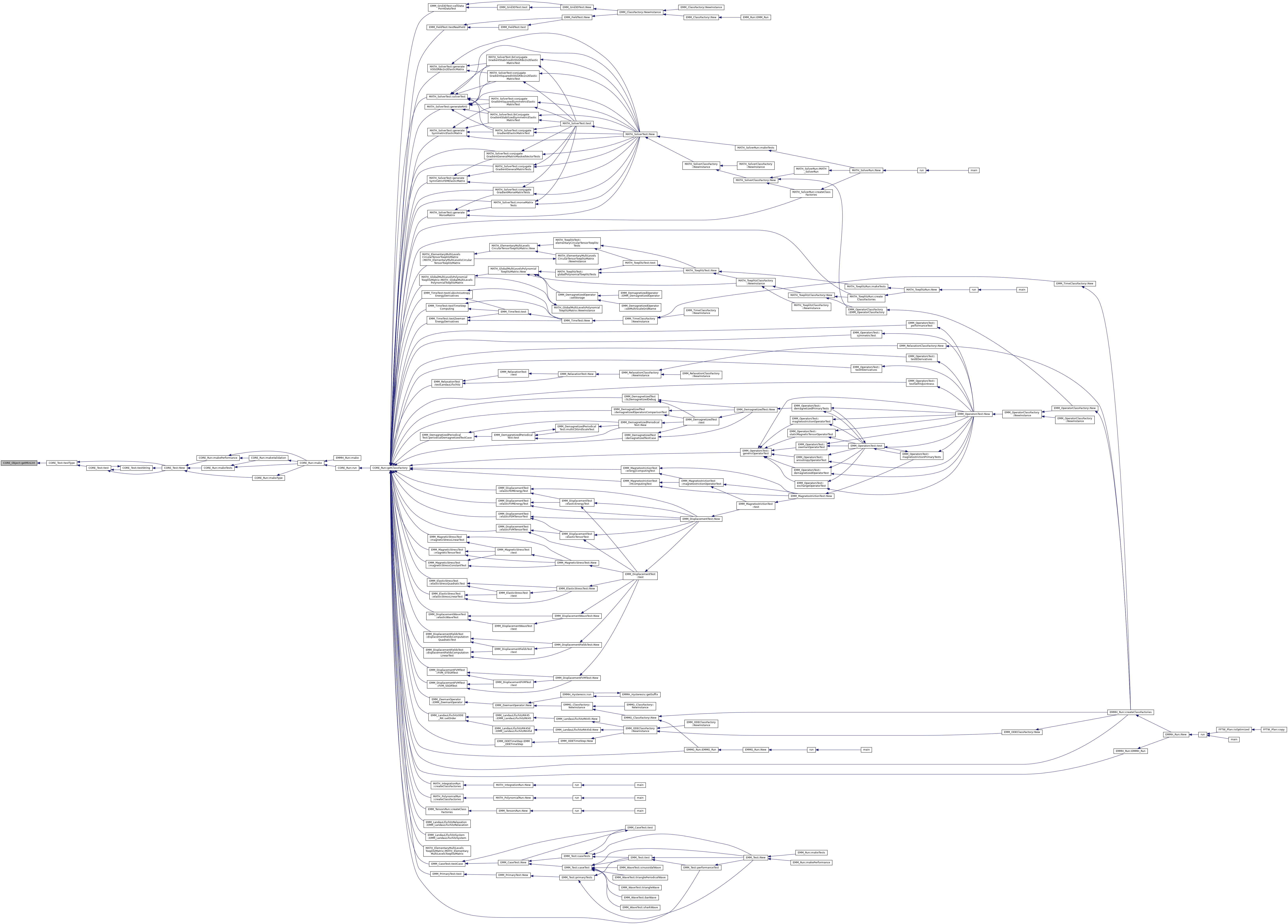
◆ getMinLLInt()
|
inlinestaticinherited |
get the min value for tLLInt type
- Returns
- the min value for tLLInt type
Referenced by CORE_Test::testType().

◆ getMinReal()
|
inlinestaticinherited |
get the min value for the real type
- Returns
- the min value for the real type
Referenced by CORE_Test::testType().
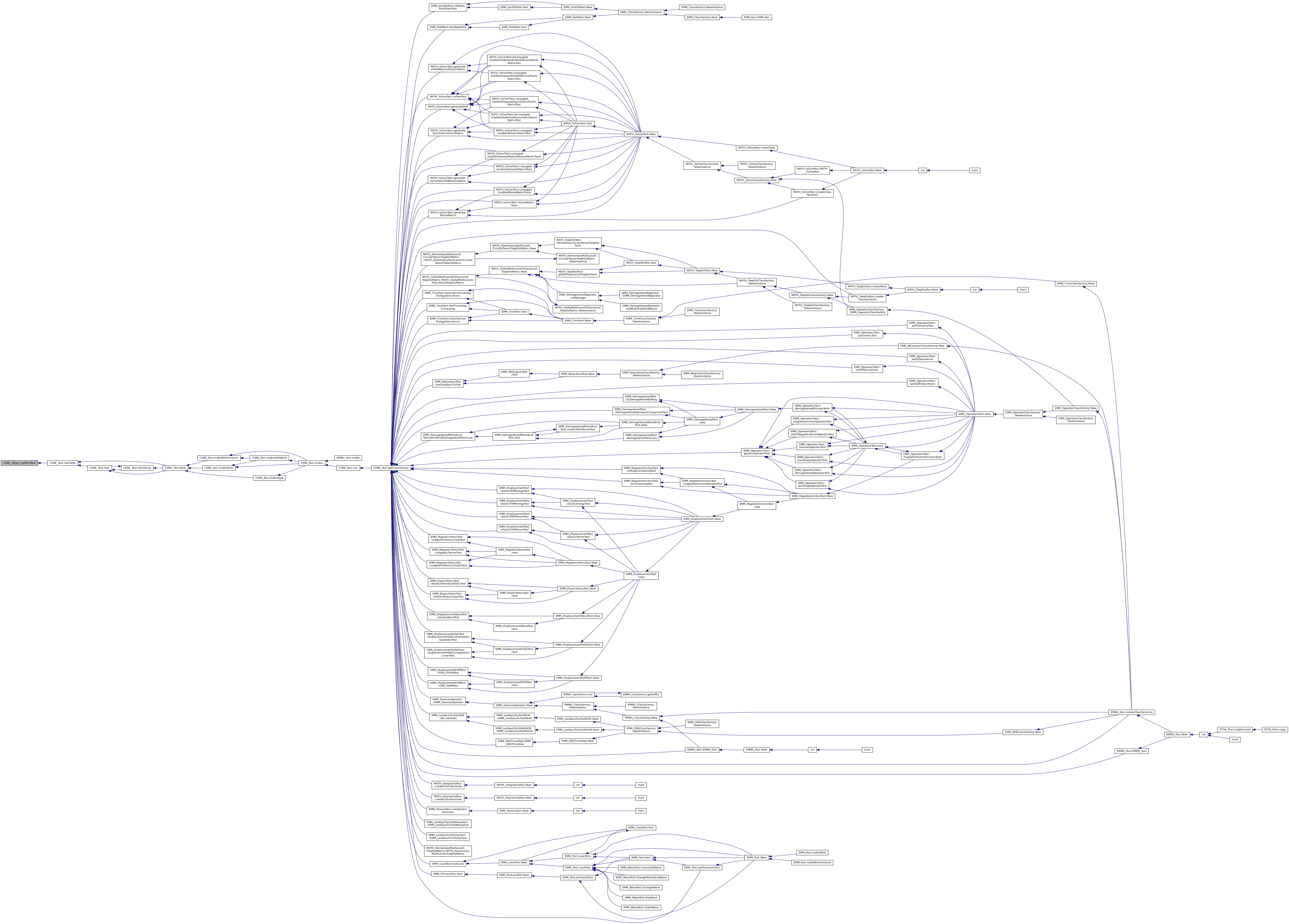
◆ getMinSInt()
|
inlinestaticinherited |
get the min value for tSInt type
- Returns
- the min value for tSInt type
Referenced by CORE_Test::testType().
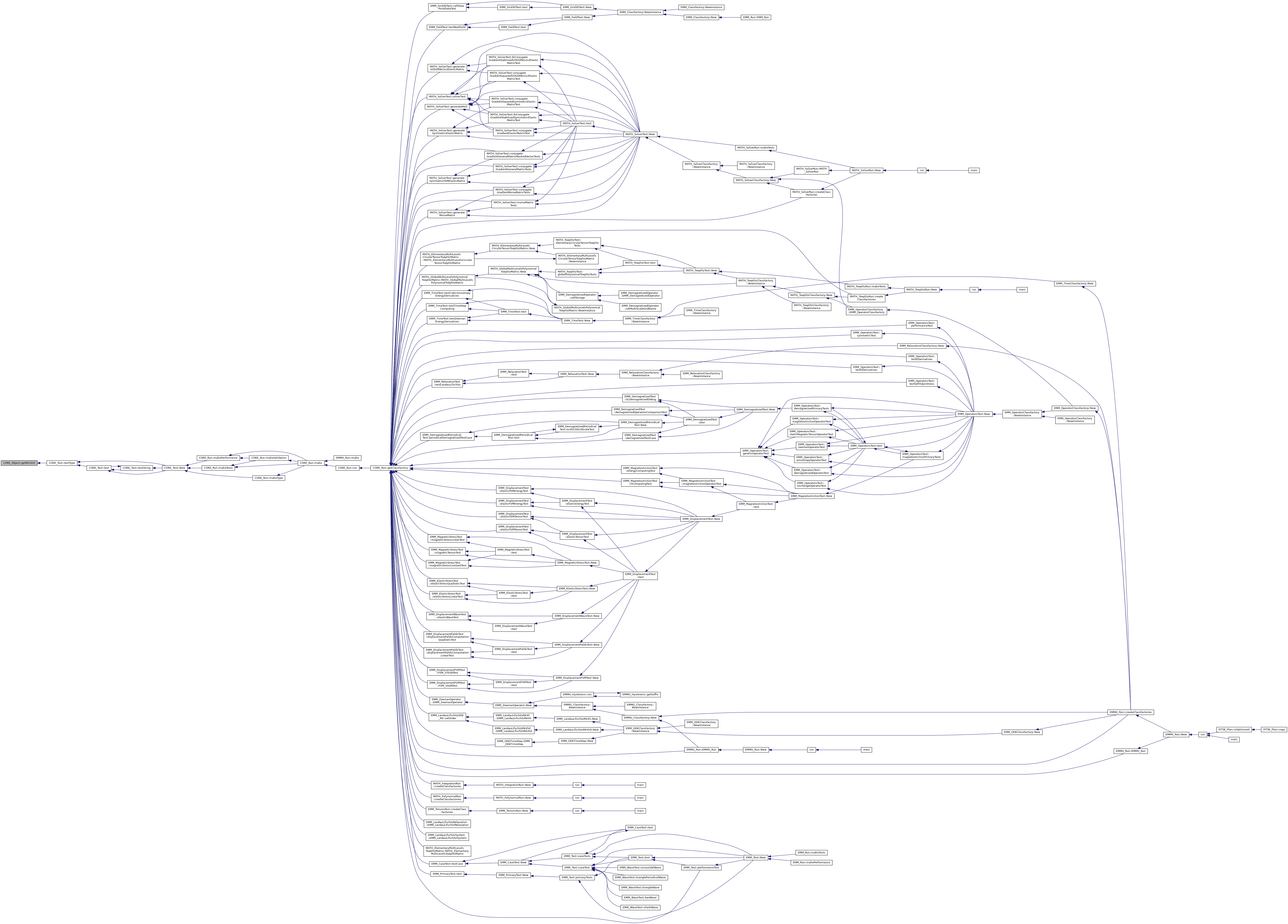
◆ getMinUChar()
|
inlinestaticinherited |
get the min value for tUChar type
- Returns
- the min value for tUChar type
Referenced by CORE_Test::testType().
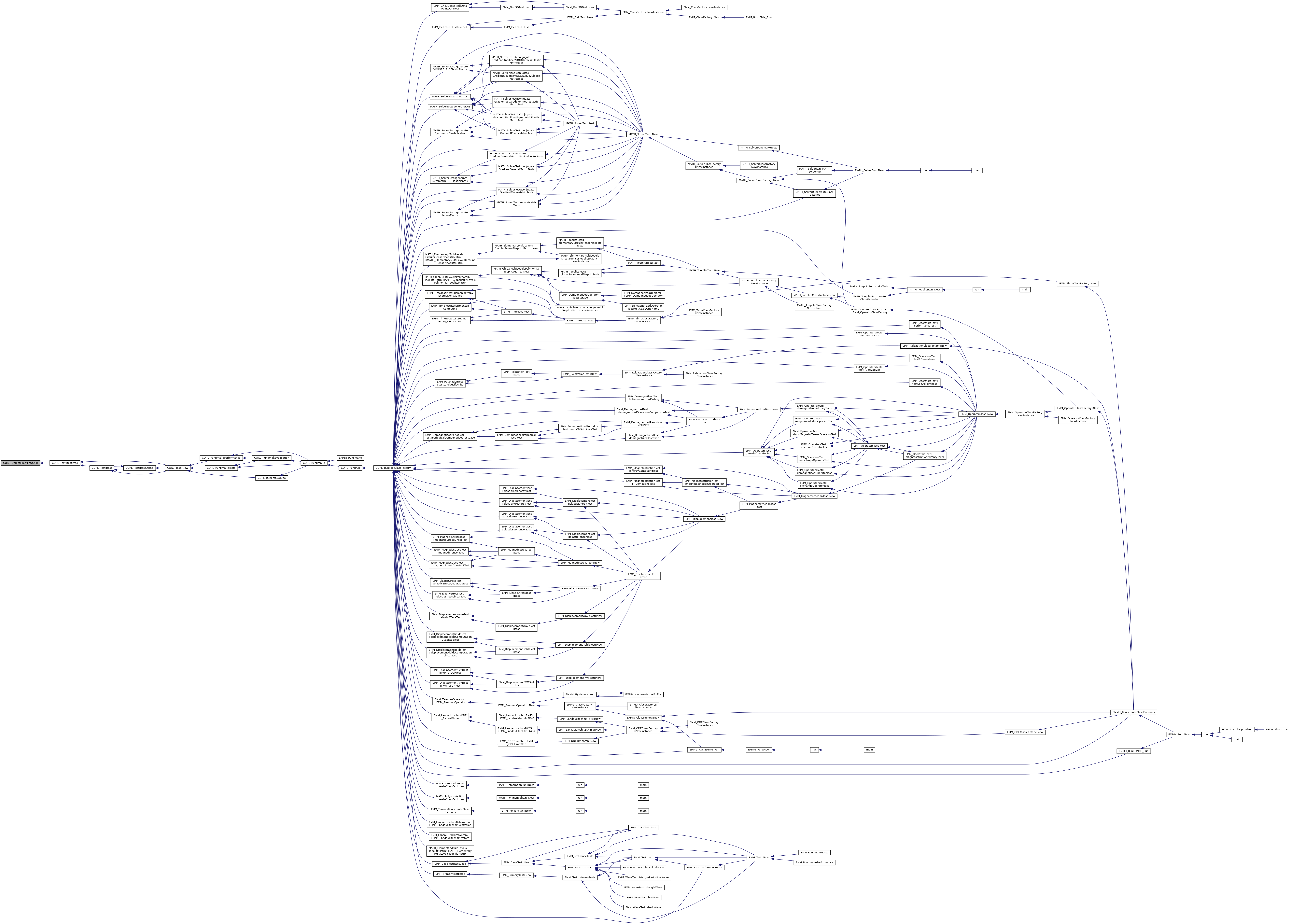
◆ getMinUIndex()
|
inlinestaticinherited |
get the min value for difference the array/vector indexing type
- Returns
- the min value for difference the array/vector indexing type
Referenced by CORE_Test::testType().
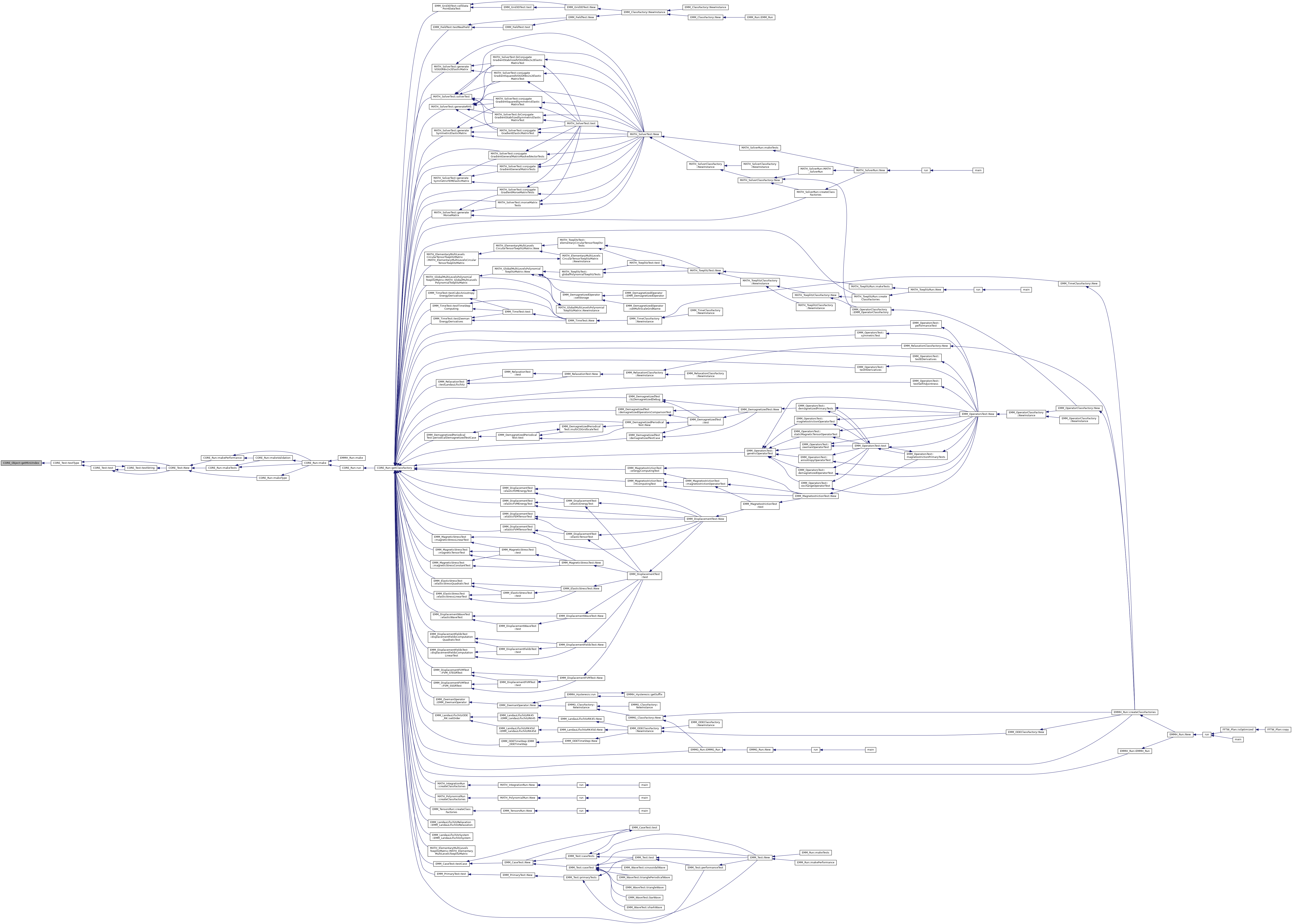
◆ getMinUInt()
|
inlinestaticinherited |
get the min value for tUInt type
- Returns
- the min value for tUInt type
Referenced by CORE_Test::testType().
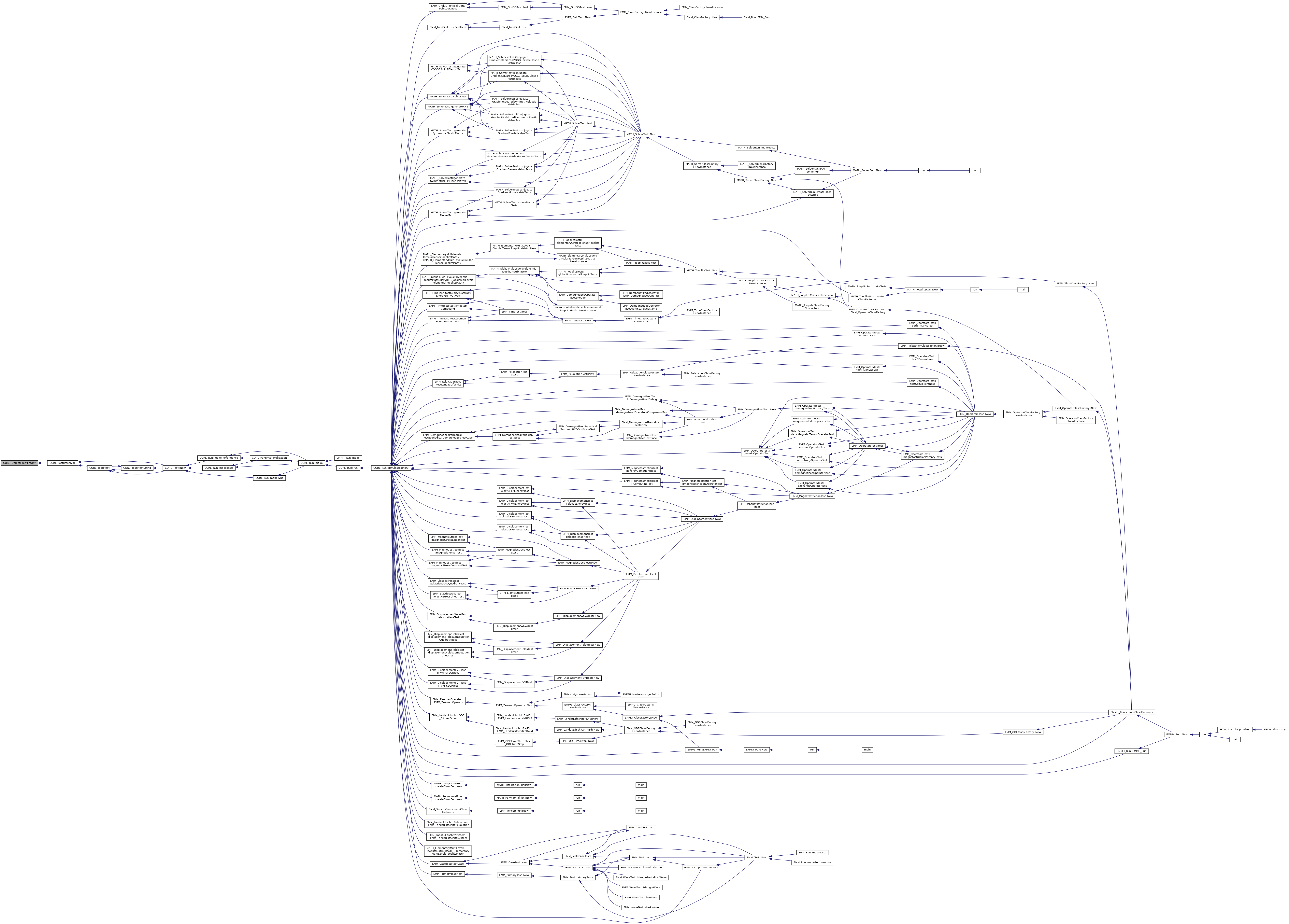
◆ getMinUInteger()
|
inlinestaticinherited |
get the min value for the unsigned integer type
- Returns
- the min value for the unsigned integer type
Referenced by CORE_Test::testType().

◆ getMinULInt()
|
inlinestaticinherited |
get the min value for tULInt type
- Returns
- the min value for tULInt type
Referenced by CORE_Test::testType().

◆ getMinULLInt()
|
inlinestaticinherited |
get the min value for tULLInt type
- Returns
- the min value for tULLInt type
Referenced by CORE_Test::testType().
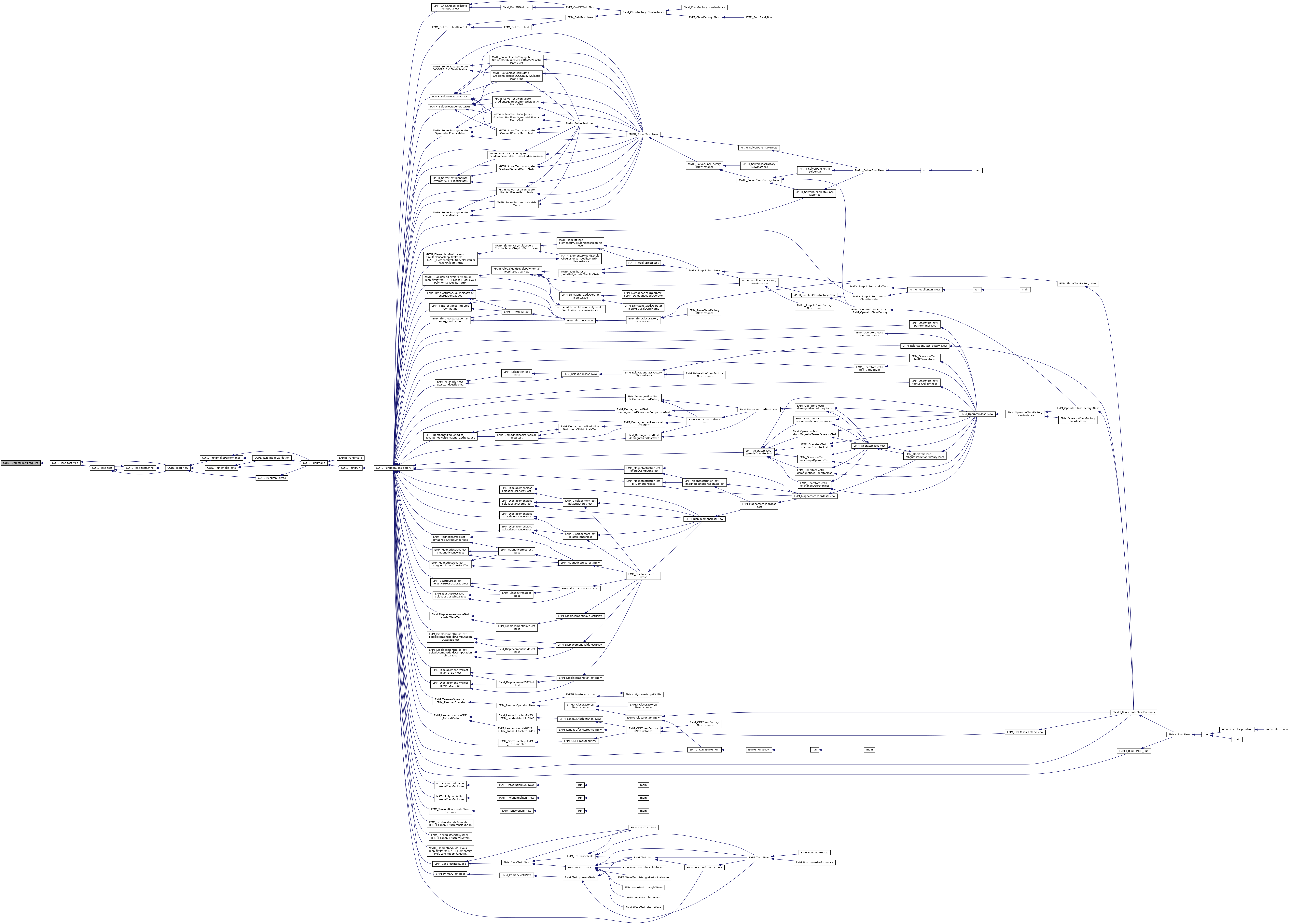
◆ getMinUSInt()
|
inlinestaticinherited |
get the min value for tUSInt type
- Returns
- the min value for tUSInt type
Referenced by CORE_Test::testType().
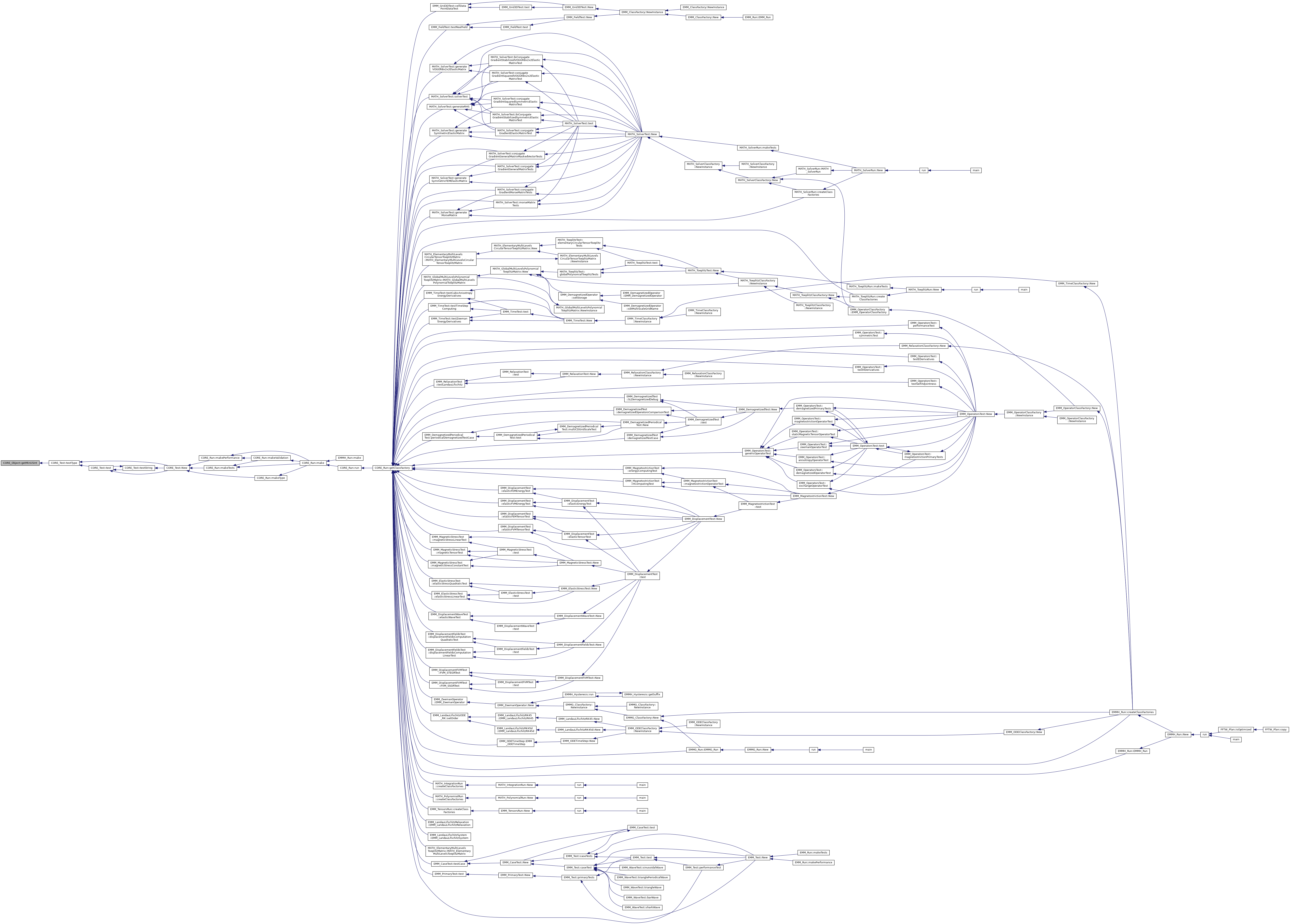
◆ getName()
|
inlinevirtualinherited |
return an human reading name of the operator
- Returns
- the name of the operator
References CORE_Object::getClassName(), EMM_Operator::isAffine(), EMM_Operator::isGradientComputationable(), tBoolean, tString, and tUIndex.
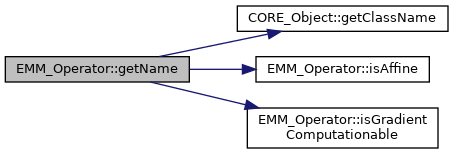
◆ getOut()
|
inlinestaticinherited |
◆ getPointerAddress()
|
inlineinherited |
return the identity string of the object
- Returns
- the identity string of the object
References CORE_Object::pointer2String().

◆ getRealEpsilon()
|
inlinestaticinherited |
get the eps which is the difference between 1 and the least value greater than 1 that is representable.
- Returns
- the eps which is the difference between 1 and the least value greater than 1 that is representable.
Referenced by MATH_P4::solveP4De(), and CORE_Test::testType().
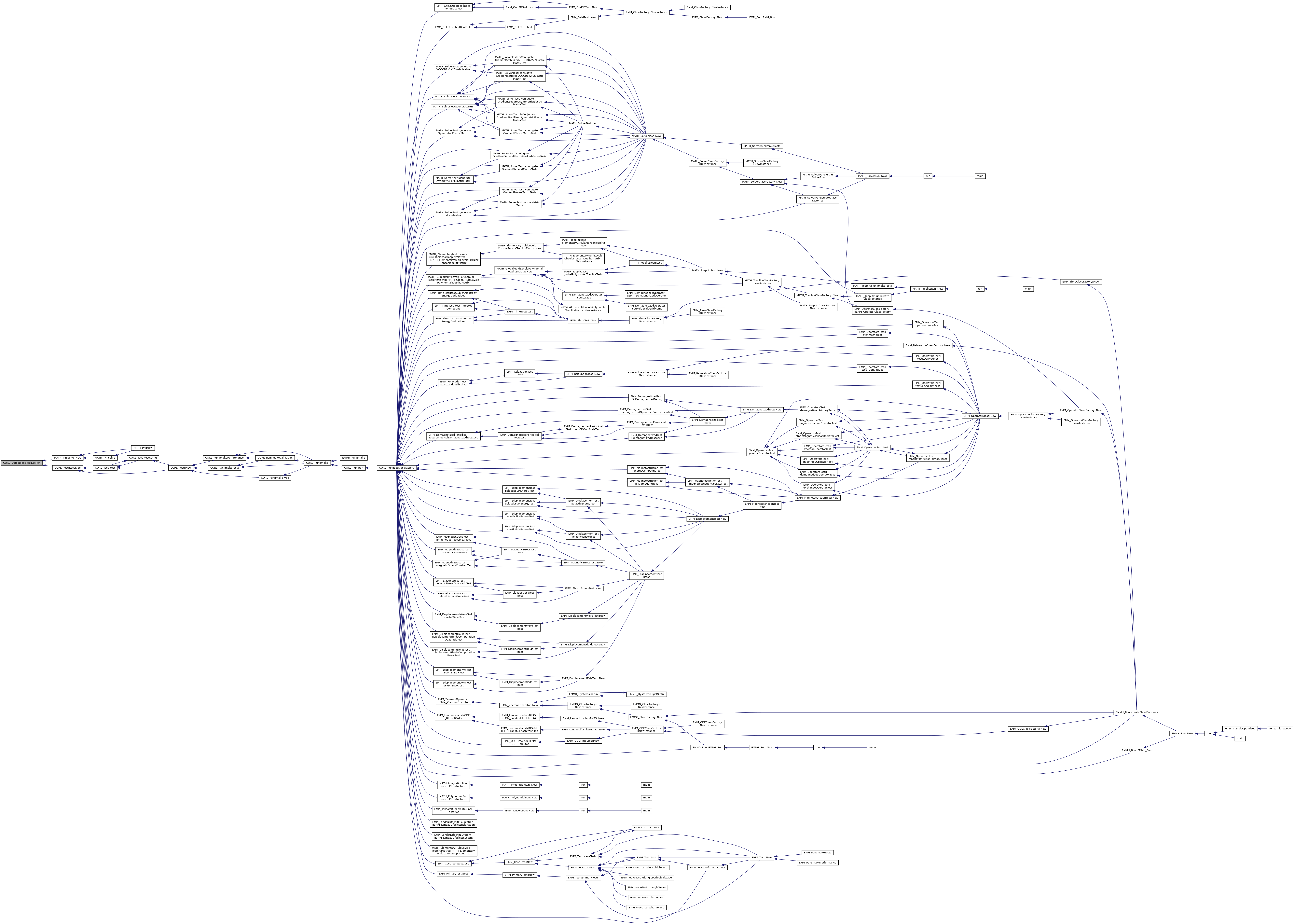
◆ getRealInfinity()
|
inlinestaticinherited |
get the infinity value
- Returns
- the inifinity value for the real type
Referenced by BrentFunction::BrentFunction(), EMM_OperatorsTest::compareDiscretizedData(), EMM_IterativeTimeStep::EMM_IterativeTimeStep(), EMM_SLElementaryDemagnetizedMatrix::Kxy(), NRFunction::NRFunction(), EMM_PolynomialInterpolationTimeStep::optimizeTimeFunction(), and CORE_Test::testType().
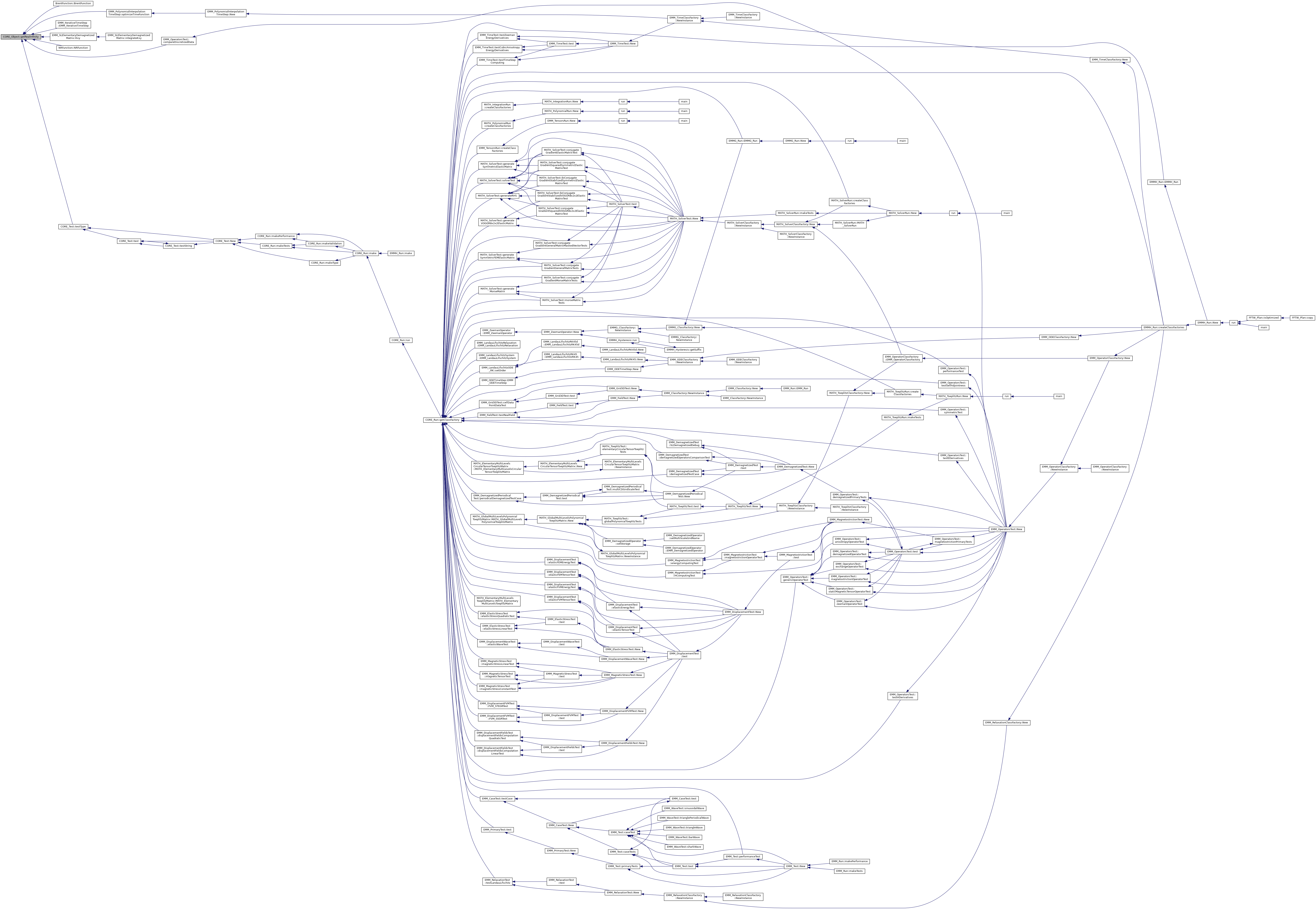
◆ getSharedPointer() [1/2]
|
inlineinherited |
get the shared pointer of this class into p
- Parameters
-
p : shared pointer of the class This
Referenced by CORE_Map< Key, Value >::getSharedPointer(), CORE_ArrayList< tString >::getSharedPointer(), EMM_Array< tCellFlag >::getSharedPointer(), CORE_Array< tCellFlag >::getSharedPointer(), CORE_MorseArray< tUChar >::getSharedPointer(), CORE_Vector< T >::getSharedPointer(), and CORE_Object::printObjectsInMemory().
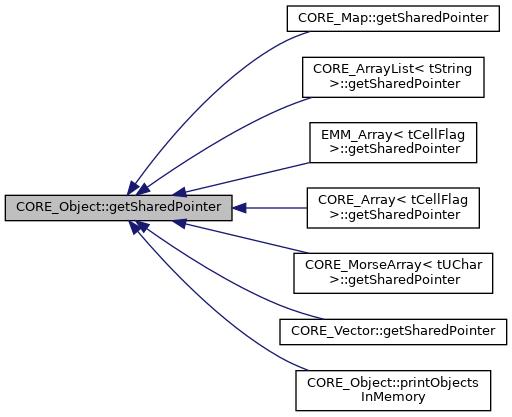
◆ getSharedPointer() [2/2]
|
inlineinherited |
get the shared pointer of this class into p
- Parameters
-
p : shared pointer of the class This
◆ getThread()
|
inlinestaticinherited |
get the profilier
- Returns
- the profiler
Referenced by MATH_MaskVector::add(), MATH_Vector::add(), EMM_DisplacementFEMOperator::addBoundaryElasticStress(), EMM_DisplacementFEMOperator::buildDataOnNeumannBoundaryFaces(), EMM_DisplacementFVMOperator::computeCineticEnergy(), EMM_DisplacementFVMOperator::computeElasticStress(), EMM_DisplacementFEMOperator::computeElasticStress(), EMM_DisplacementFVMOperator::computeElasticTensor(), EMM_DisplacementFEMOperator::computeElasticTensor(), EMM_StaticMagneticTensorOperator::computeEnergy(), EMM_CubicAnisotropyOperator::computeEnergy(), EMM_MagnetostrictionOperator::computeEnergy(), EMM_DisplacementOperator::computeEnergy(), EMM_AnisotropyOperator::computeEnergyWithMagneticExcitation(), EMM_DisplacementFVMOperator::computeEquilibriumMatrixDiagonalConditioner(), EMM_DisplacementFEMOperator::computeEquilibriumMatrixDiagonalConditioner(), EMM_FullExchangeOperator::computeMagneticExcitationField(), EMM_StaticMagnetostrictionOperator::computeMagneticExcitationField(), EMM_LinearAnisotropyOperator::computeMagneticExcitationField(), EMM_StaticMagneticTensorOperator::computeMagneticExcitationField(), EMM_CubicAnisotropyOperator::computeMagneticExcitationField(), EMM_MinimalExchangeOperator::computeMagneticExcitationField(), EMM_AnisotropyOperator::computeMagneticExcitationField(), EMM_MagnetostrictionOperator::computeMagneticExcitationField(), EMM_CubicAnisotropyOperator::computeMagneticExcitationFieldGradient(), EMM_AnisotropyOperator::computeMagneticExcitationFieldGradient(), EMM_DisplacementFVMOperator::computeMagneticStress(), EMM_DisplacementFEMOperator::computeMagneticStress(), EMM_OptimalTimeStep::computeOptimalTimeStep(), EMM_DisplacementFEMOperator::computeStressConstraintEnergy(), EMM_FullExchangeOperator::discretize(), EMM_MinimalExchangeOperator::discretize(), EMM_CondensedMassMatrix::discretize(), EMM_LinearAnisotropyOperator::discretize(), EMM_AnisotropyOperator::discretize(), EMM_DemagnetizedOperator::discretize(), EMMG_SLDemagnetizedOperator::discretize(), EMM_LandauLifschitzSystem::discretize(), MATH_Vector::divide(), MATH_MaskVector::dot(), MATH_Vector::dot(), EMM_4SymmetricTensors::doubleDot(), EMM_4Tensors::doubleDotCrossDoubleDotScalar(), EMM_4Tensors::doubleDotCrossProduct(), EMM_4Tensors::doubleDotCrossSquaredScalar(), EMM_4Tensors::doubleDotProduct(), MATH_Vector::init(), MATH_MaskVector::init(), EMM_LandauLifschitzODE_RK::integrateMagnetizationFieldAtTime(), EMM_DisplacementFVM_Interpolator::interpolateUAtVertices(), EMMG_SLDemagnetizedOperator::localAssembly(), EMM_DisplacementOperator::nullProjectionOnDirichletBoundary(), EMM_DisplacementOperator::periodicProjection(), EMM_2PackedSymmetricTensors::product(), EMM_CanonicalMassMatrix::product(), MATH_FullMatrix::product(), EMM_CondensedMassMatrix::product(), EMM_BlockMassMatrix::product(), MATH_MorseMatrix::product(), EMMG_SLDemagnetizedOperator::product(), EMM_DisplacementOperator::projectionOnDirichletBoundary(), EMM_LandauLifschitzSystem::resetOperatorsToInitialState(), EMM_DisplacementFVMOperator::setBoundaryFaceTypes(), FFTW_MultiDFTs::setFFT(), FFTW_MultiLevelsDFT::setFFT(), FFTW_MultiLevelsDFT::setLevels(), FFTW_MultiDFTs::setPlan(), FFTW_MultiLevelsDFT::setPlan(), EMM_CondensedMassMatrix::solve(), EMM_LandauLifschitzODE::solveODE(), EMM_4SymmetricTensors::squaredDoubleDot(), EMM_4Tensors::squaredDoubleDotCrossScalar(), EMM_4Tensors::squaredDoubleDotScalar(), EMM_CanonicalMassMatrix::symmetricDot(), EMM_CondensedMassMatrix::symmetricDot(), EMM_BlockMassMatrix::symmetricDot(), FFTW_Test::test(), MATH_SolverTest::test(), EMM_ODETest::testODE(), and EMM_Grid3D::updateLimitConditionOnPoints().

◆ getTypeName()
|
inlinestaticinherited |
◆ is32Architecture()
|
inlinestaticinherited |
return true if the machine is a 32 bits machine
- Returns
- true is the computing is done in a 32 bits machine
References CORE_Object::pointer2String(), CORE_Object::printObjectsInMemory(), and tString.
Referenced by CORE_Test::testType().


◆ is64Architecture()
|
inlinestaticinherited |
return true if the machine is a 64 bits machine
- Returns
- true is the computing is done in a 64 bits machine
Referenced by EMM_VTK::getVTKType(), and CORE_Test::testType().
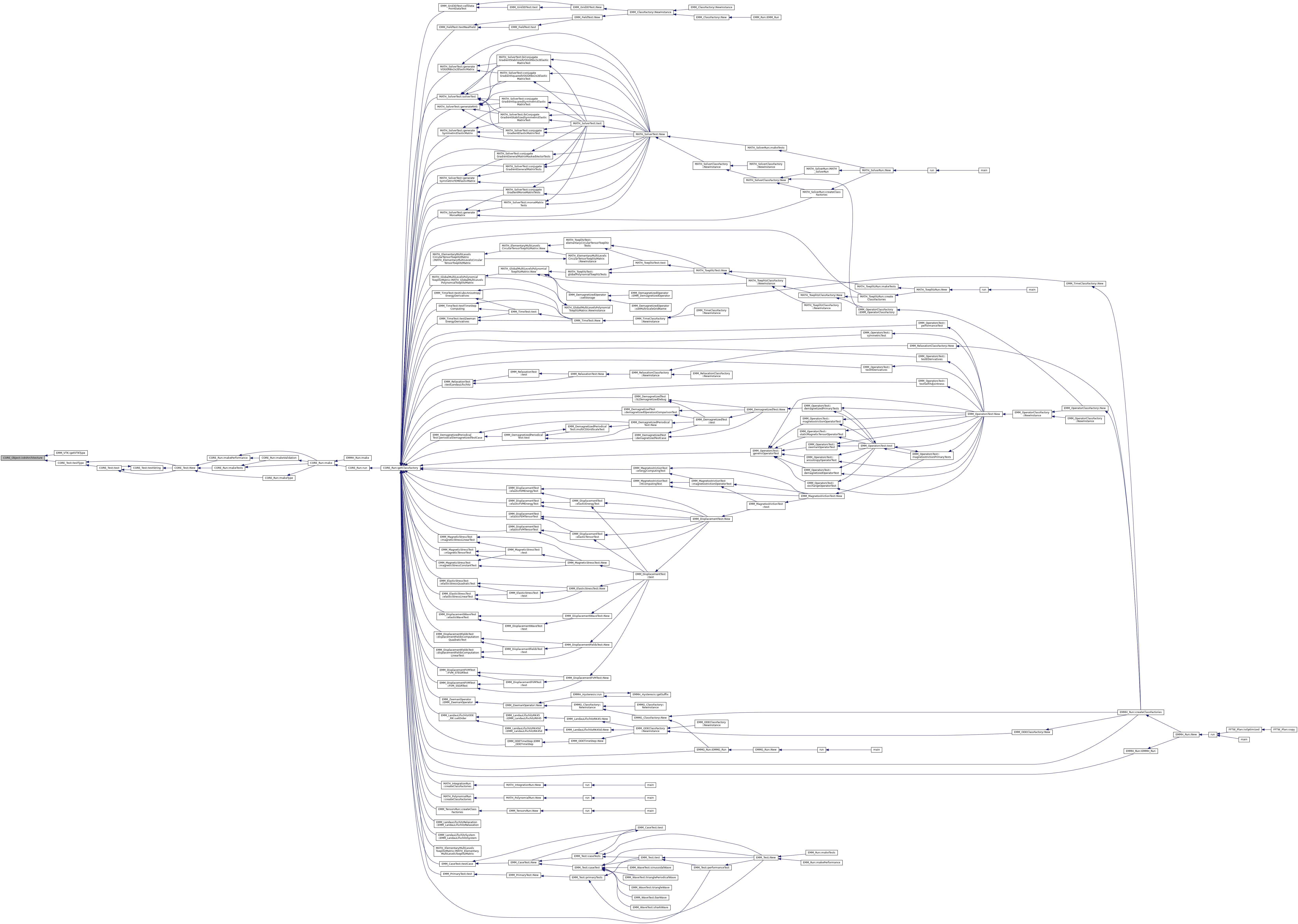
◆ isAffine()
|
inlinevirtualinherited |
return true if the operator is either constant or linear
- Returns
- true if the operator is either constant or linear
Implements EMM_Operator.
◆ isCubicVolume()
|
inlineinherited |
return the true if the element is cubic
- Returns
- true is all size of the volum is same
References EMM_Operator::mIsCubic.
Referenced by EMM_FullExchangeOperator::discretize(), and EMM_MinimalExchangeOperator::discretize().

◆ isGradientComputationable()
|
inlinevirtualinherited |
return true if the gradient of the magnetic excitation is computationable
- Returns
- true if the the gradient of the magnetic excitation is computationable
Implements EMM_Operator.
◆ isInstanceOf() [1/2]
|
inlineinherited |
test if the clas T is an instance of this class
- Returns
- true if the object is an instance of T
References null.
Referenced by MATH_ToeplitzTest::toeplitzTest().

◆ isInstanceOf() [2/2]
test if the object is an instance of className
- Parameters
-
name name of the class
- Returns
- true if the object is an instance of class Name
References CORE_Object::getIdentityString().

◆ isMemoryChecked()
|
inlinestaticinherited |
get if the memory checking is used
- Returns
- true: if the memory checking is used.
References CORE_Object::getClassName(), CORE_Object::mIsMemoryTesting, and tString.
Referenced by main().


◆ New()
|
inlinestatic |
create a cubic anisotropy operator
- Returns
- a shared cubic to a planar anisotropy operator
References EMMG_MagnetostrictionOperator().
Referenced by EMMG_ClassFactory::NewInstance().


◆ out()
|
inlinestaticinherited |
get the output
- Returns
- the output stream
Referenced by EMM_Matter::adimensionize(), EMM_DisplacementFVMOperator::backup(), EMM_DisplacementOperator::backup(), MATH_ElementaryMultiLevelsToeplitzMatrix::buildSpectralVectorProjector(), EMM_Test::caseTest(), EMM_Test::caseTests(), EMM_MatterField::computeAnisotropyDirectionsField(), EMM_OptimalTimeStep::computeOptimalTimeStep(), MATH_MultiLevelsToeplitzMatrix::copy(), CORE_Exception::CORE_Exception(), EMM_MatterField::createAnisotropyOperator(), CORE_Run::createIO(), EMM_ElementaryTest::defaultBackupTest(), EMM_ElementaryTest::defaultTest(), MATH_MultiLevelsFFTToeplitzMatrix::diagonalize(), EMM_DisplacementFVMOperator::discretize(), EMM_MagnetostrictionOperator::discretize(), EMM_DisplacementFEMOperator::discretize(), EMM_4SymmetricTensors::doubleDot(), EMM_4Tensors::doubleDotCrossDoubleDotScalar(), EMM_TensorsTest::doubleDotCrossDoubleDotScalarTests(), EMM_4Tensors::doubleDotCrossProduct(), EMM_TensorsTest::doubleDotCrossProductTests(), EMM_4Tensors::doubleDotCrossSquaredScalar(), EMM_TensorsTest::doubleDotCrossSquaredScalarTests(), EMM_4Tensors::doubleDotProduct(), EMM_TensorsTest::doubleDotProductTests(), EMM_DisplacementWaveTest::elasticWaveTest(), EMM_Test::elementaryTests(), FFTW_Test::fftwTutorial(), MATH_IntegrationTest::gaussLegendreTest(), EMM_MagnetostrictionTest::HComputingTest(), EMM_DemagnetizedPeriodicalTest::HTest(), EMMH_HysteresisTest::hysteresisDefaultCycleTest(), EMM_TensorsTest::initializationTests(), EMM_MultiScaleGrid::initialize(), EMM_MultiScaleSDGrid::initialize(), EMM_MatterField::loadFromANIFile(), EMM_AnisotropyDirectionsField::loadFromFile(), EMM_Matter::loadFromFile(), EMM_Grid3D::loadFromGEOFile(), EMM_MatterField::loadFromLOCFile(), EMM_Array< tCellFlag >::loadFromStream(), EMM_Matter::loadFromStream(), EMM_Matter::loadMattersFromFile(), EMM_Run::loadSystemFromOptions(), EMM_ElementaryTest::magnetostrictionBackupTest(), CORE_Run::make(), EMMH_Run::makeHysteresis(), EMM_Run::makeRun(), CORE_Run::makeType(), EMM_ElementaryTest::optionsTest(), MATH_PolynomialTest::P4Tests(), EMM_Test::primaryTests(), EMM_LandauLifschitzSystem::printLog(), CORE_Run::printOptions(), EMM_2PackedSymmetricTensors::product(), EMMG_SLDemagnetizedOperator::projectionOnSpectralSpace(), CORE_Run::readOptionsFromCommandLine(), CORE_Test::readVectorTest(), EMM_DemagnetizedPeriodicalTest::relaxationTest(), EMM_DisplacementFVMOperator::restore(), EMM_DisplacementOperator::restore(), EMM_Input::restoreBackup(), EMMH_Hysteresis::run(), EMM_Output::save(), EMM_AnisotropyDirectionsField::saveToFile(), EMM_MatterField::saveToFile(), EMM_Grid3D::saveToGEOFile(), CORE_IOTest::searchTest(), EMMH_Hysteresis::setInitialMagnetizationField(), MATH_MultiLevelsToeplitzMatrix::setLevels(), EMM_4SymmetricTensors::squaredDoubleDot(), EMM_4Tensors::squaredDoubleDotCrossScalar(), EMM_TensorsTest::squaredDoubleDotCrossScalarTests(), EMM_4Tensors::squaredDoubleDotScalar(), EMM_TensorsTest::squaredDoubleDotScalarTests(), EMM_TensorsTest::squaredDoubleDotTests(), EMM_MatterTest::testAdimensionize(), EMM_MatterTest::testANIFile(), CORE_Test::testComplex(), CORE_Test::testDateWeek(), FFTW_Test::testDFT(), EMM_MatterTest::testIO(), EMM_ODETest::testODE(), CORE_Test::testOut(), CORE_Test::testReal(), EMM_FieldTest::testRealArray(), EMM_Grid3DTest::testSegment(), EMM_Grid3DTest::testThinSheet(), CORE_Test::testTime(), CORE_Test::testType(), MATH_FullMatrix::toString(), EMM_DemagnetizedPeriodicalTest::xyPeriodicalCubeSDGTest(), and EMM_DemagnetizedPeriodicalTest::xyPeriodicalSheetSDGTest().

◆ pointer2String()
|
staticinherited |
return the string representation of a pointer
- Parameters
-
obj : oject to get the string pointer
- Returns
- the string pointer of the object
References tString.
Referenced by CORE_Object::CORE_Object(), CORE_Object::getIdentityString(), CORE_Object::getPointerAddress(), CORE_Object::is32Architecture(), and CORE_Object::~CORE_Object().

◆ printObjectsInMemory() [1/2]
|
staticinherited |
print object in memory
- Parameters
-
f : output to print the objects in memory
References CORE_Object::getIdentityString(), CORE_Object::getSharedPointer(), CORE_Object::mIsMemoryTesting, CORE_Object::mObjects, and tInteger.

◆ printObjectsInMemory() [2/2]
|
inlinestaticinherited |
print object in memory in the standart output
Referenced by CORE_Object::is32Architecture(), and main().
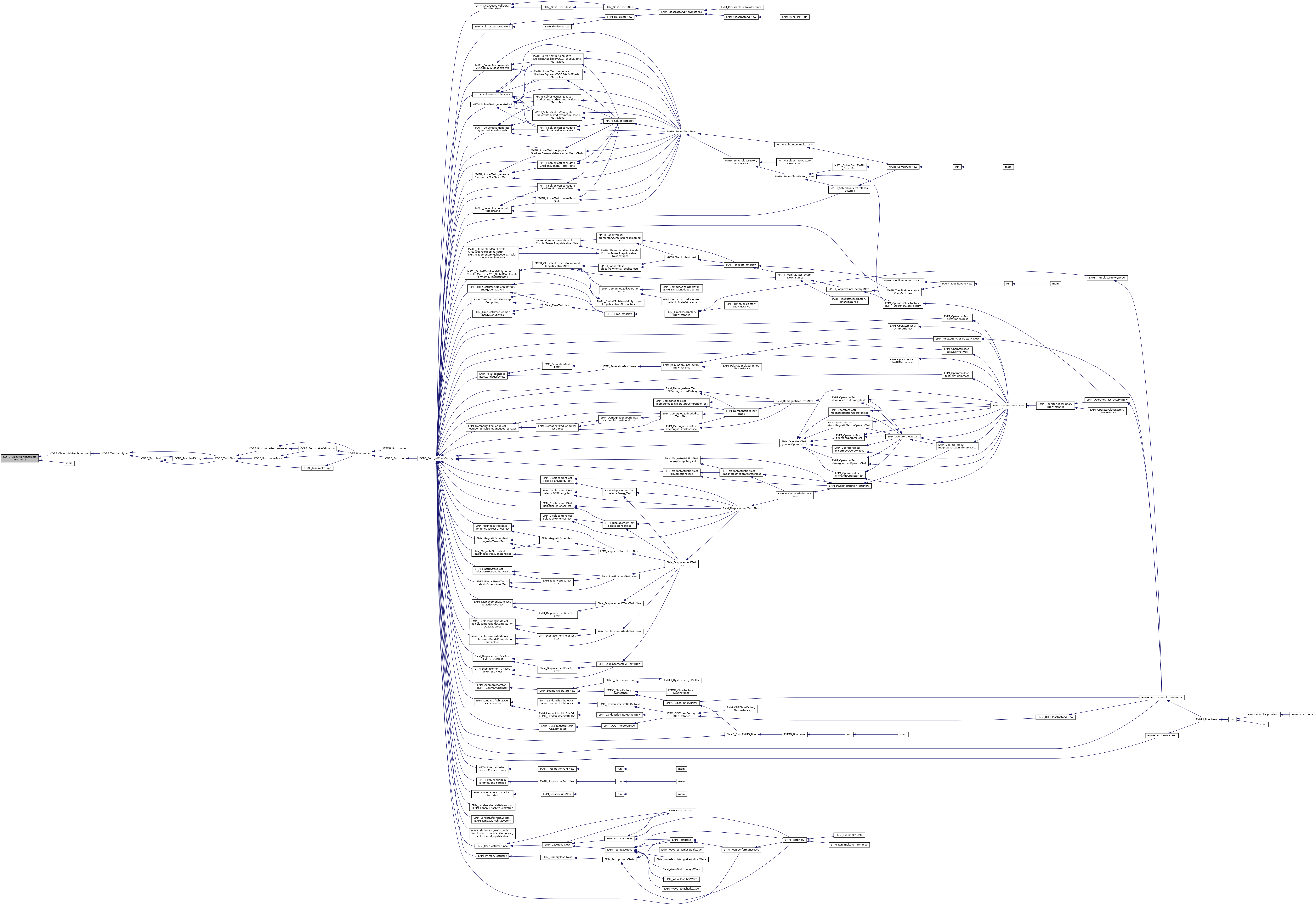
◆ resetDisplacementOperator()
|
inherited |
reset the reverse relation Displacement operator
References EMM_MagnetostrictionOperator::mDisplacementOperator, and null.
Referenced by EMM_MagnetostrictionOperator::setDisplacementOperator(), and EMM_MagnetostrictionOperator::setIsMagneticAdimension().

◆ resetOut()
|
inlinestaticinherited |
◆ resetThread()
|
inlinestaticinherited |
◆ resetToInitialState()
|
virtualinherited |
reset the operator at initial state t=0
- Parameters
-
system the data to initialize the operator
- Returns
- true if it succeeds
- call EMM_DisplacementOperator::resetToInitialState()
- compute elastic tensor

Implements EMM_Operator.
References EMM_MagnetostrictionOperator::mDisplacementOperator.
Referenced by EMM_MagnetostrictionOperator::adimensionize().

◆ restore()
|
virtualinherited |
restore the operator data from file(s)
- Parameters
-
system : general data to restore the operator prefix : common prefix of the saving files suffix : common suffix of the saving files ext : common extension of the saving files
- Returns
- if the displacement operaor backup has succeeded
Reimplemented from EMM_Operator.
References EMM_MagnetostrictionOperator::mDisplacementOperator.
Referenced by EMM_MagnetostrictionOperator::getDataField().

◆ setDisplacementMethod()
|
inherited |
set the displacement method "FEM" or "FVM" ("FDM" deprecated)
- Parameters
-
m the displacement method either "FEM" or "FVM"
References CORE_String::New().
Referenced by EMM_MagnetostrictionOperator::setIsMagneticAdimension().


◆ setDisplacementOperator()
|
inherited |
set the reverse relation Displacement operator
- Parameters
-
op the displacement operator
References EMM_MagnetostrictionOperator::mDisplacementOperator, null, and EMM_MagnetostrictionOperator::resetDisplacementOperator().
Referenced by EMM_MagnetostrictionOperator::setIsMagneticAdimension().


◆ setIsMagneticAdimension()
|
inlineinherited |
set if the adimensionment of the equation is magnetic
- Parameters
-
v is magnetic adimension
References EMM_MagnetostrictionOperator::resetDisplacementOperator(), EMM_MagnetostrictionOperator::setDisplacementMethod(), EMM_MagnetostrictionOperator::setDisplacementOperator(), and tString.

◆ setIsMemoryChecked()
|
inlinestaticinherited |
set if the memory checking is used
- Parameters
-
v : true to check memory
Referenced by main().

◆ setOut()
|
inlinestaticinherited |
◆ setThis()
|
inlineprotectedinherited |
set this weak shared pointer called toDoAfterThis setting method
- Parameters
-
p : shared pointer of the class This
References CORE_Object::toDoAfterThisSetting().

◆ setThread()
|
inlinestaticinherited |
set the thread
- Parameters
-
thread the shared pointer to the thread
References null.
Referenced by EMM_Run::EMM_Run(), EMM_TensorsRun::EMM_TensorsRun(), and MATH_SolverRun::MATH_SolverRun().

◆ SP_OBJECT()
|
private |
◆ toDoAfterThisSetting()
|
inlineprotectedvirtualinherited |
method called after the setting of the shared pointer this method can only be called once.
Reimplemented from CORE_Object.
Reimplemented in EMM_DisplacementOperator, EMM_DisplacementFVMOperator, EMM_GaussLegendreRelaxation, and EMM_GradGaussLegendreRelaxation.
Referenced by EMM_GaussLegendreRelaxation::toDoAfterThisSetting(), and EMM_DisplacementOperator::toDoAfterThisSetting().

◆ toString()
|
protectedvirtualinherited |
turn the operator into string
Reimplemented from CORE_Object.
References CORE_Object::toString().
Referenced by EMM_MagnetostrictionOperator::computeMagneticExcitationFieldGradient().


◆ updateAtNextTimeStep()
|
virtualinherited |
update the data of operator at next time step
- Parameters
-
dt the time step (if dt==0) upadte the field at initialization of the relaxation sigma the magnetized weight of each cell Mt the magnetization field at each point at next time step
- Returns
- true if the updating of the operator has succeeded
Implements EMM_Operator.
References EMM_MagnetostrictionOperator::mDisplacementOperator.
Referenced by EMM_MagnetostrictionOperator::getDataField().

Member Data Documentation
◆ Gamma
|
staticinherited |
◆ Mu0
|
staticinherited |
Referenced by EMM_MatterField::adimensionize(), EMM_MagnetostrictionOperator::adimensionize(), EMM_Matter::adimensionize(), EMM_CubicAnisotropyOperator::ComputeMagneticExcitation(), EMM_CubicAnisotropyOperator::computeMagneticExcitationField(), EMM_CubicAnisotropyOperator::computeMagneticExcitationFieldGradient(), EMM_CubicAnisotropyOperator::ComputeMagneticExcitationGradient(), EMM_Test::createMatters(), EMM_MatterField::getElasticTensorAdimensionizedParameter(), and EMM_MatterTest::testAdimensionize().
◆ NULL_VALUE
|
staticinherited |
Referenced by EMM_DisplacementFVM_VOGGROperator::computeGradAlmostNullUAtCellByOstrogradskiGreenIntegration(), EMM_DisplacementFVM_VTEGROperator::computeGradAlmostNullUAtCellByTaylorExpansionWithNeumannInterpolation(), EMM_DisplacementFVM_SSGROperator::computeGradAlmostNullUAtFaceByStokesIntegration(), EMM_DisplacementFVM_VOGGROperator::computeGradAlmostNullUAtNextCellByOstrogradskiGreenIntegration(), EMM_DisplacementFVM_VTEGROperator::computeGradUAtCellByTaylorExpansionWithNeumannInterpolation(), EMM_DisplacementFVM_VGROperator::computeGradUAtFace(), EMM_DisplacementFVM_SSGROperator::computeGradUAtFaceByStokesIntegration(), EMM_DisplacementFVM_STEGROperator::computeGradUAtFaceByTaylorExpansion(), EMM_DisplacementFVM_Interpolator::interpolateUAtEdge(), and EMM_DisplacementFVM_Interpolator::interpolateUAtVertices().
◆ X
|
staticinherited |
◆ Y
|
staticinherited |
Referenced by EMMG_SLSDXPeriodicMultiScale::computeMultiGridExcitationField(), EMMG_RealField::fitToSize(), EMM_MassMatrix::getElementVolume(), EMM_CanonicalMassMatrix::isSymmetric(), EMM_BlockMassMatrix::product(), EMM_CondensedMassMatrix::product(), EMM_RealField::setValue(), EMM_CanonicalMassMatrix::solve(), EMM_BlockMassMatrix::solve(), EMM_BlockMassMatrix::toString(), and EMMG_RealField::wedge().
◆ Z
|
staticinherited |
The documentation for this class was generated from the following file:

![$ \tilde \lambda^e=\tilde \lambda^e[m][l][r][s] $](form_1187.png)


![$ c_1+=\tilde \lambda^m[r][s][t][v]*Ml_i[t]*Mm_i[v] $](form_1190.png)
![$ c_1+=\epsilon[r][s] $](form_1191.png)



 1.8.13
1.8.13